
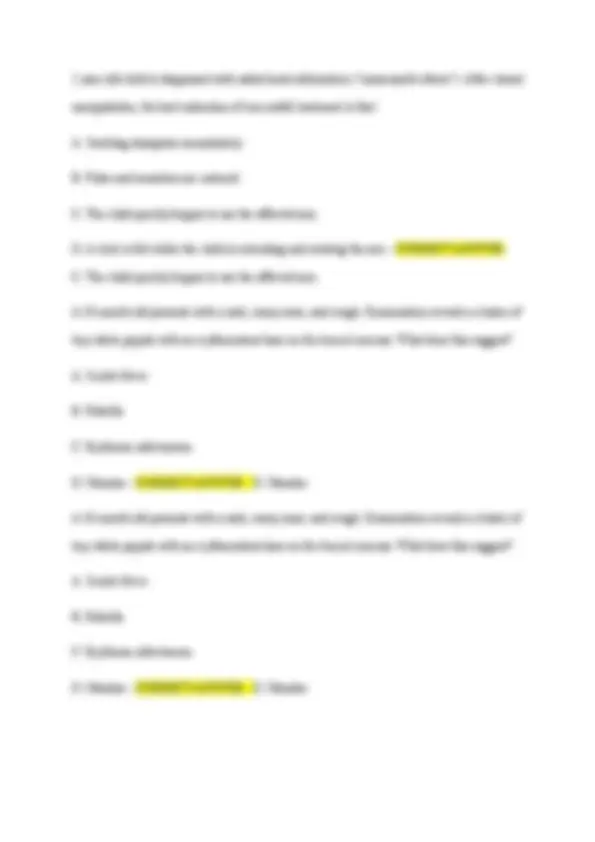
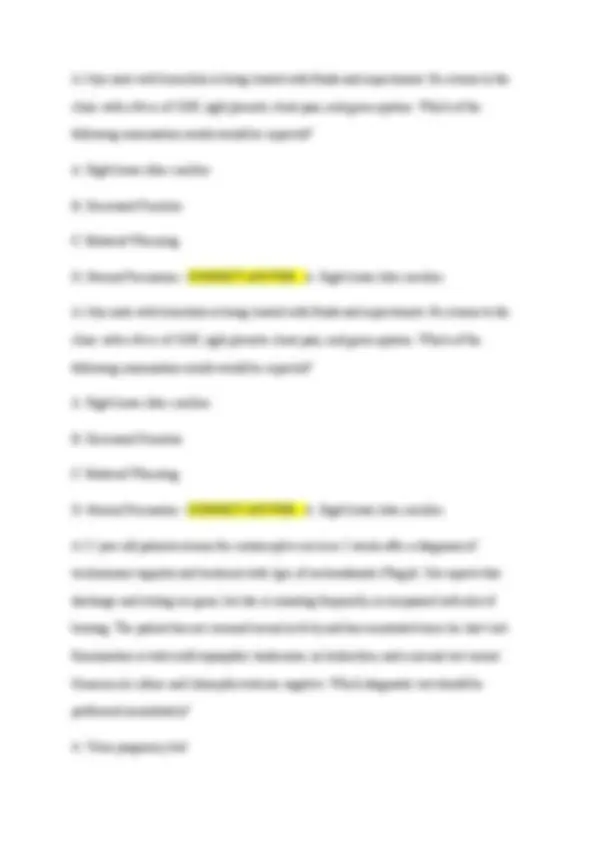
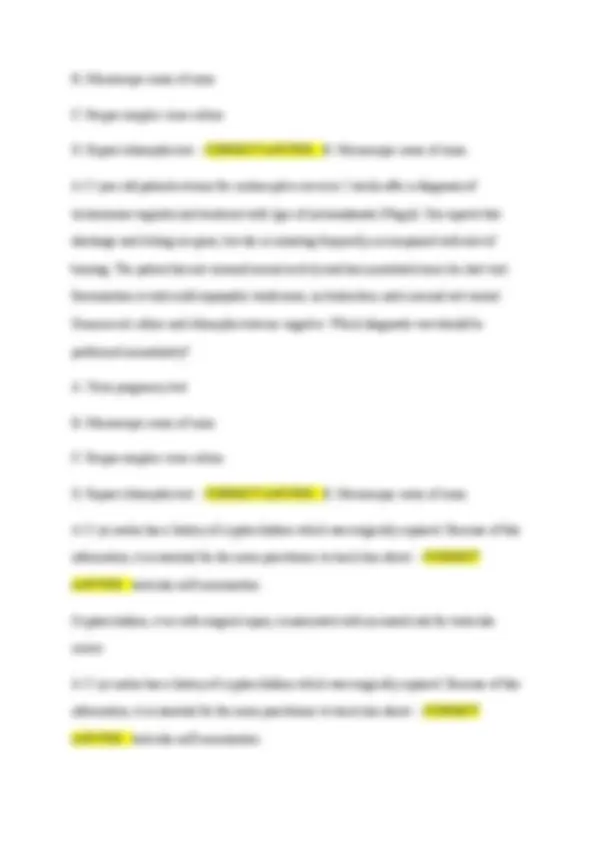
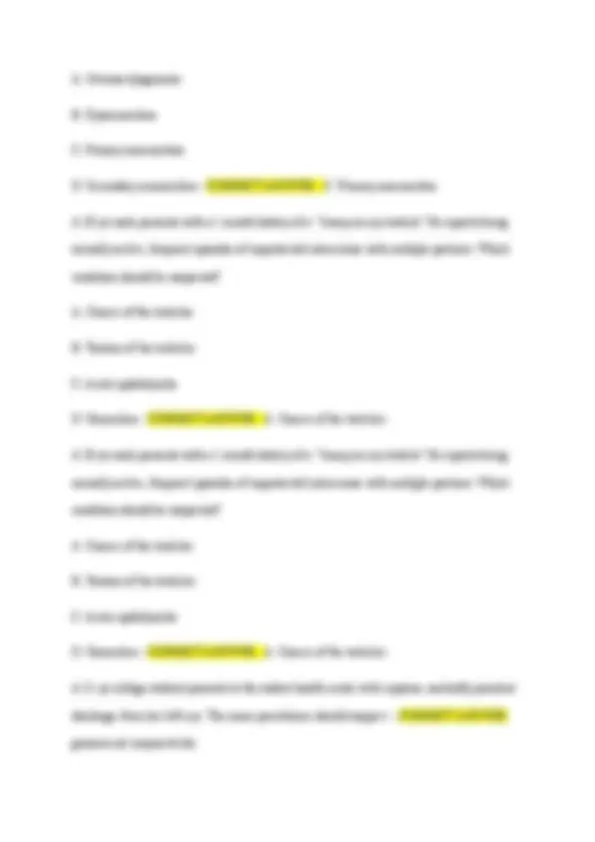
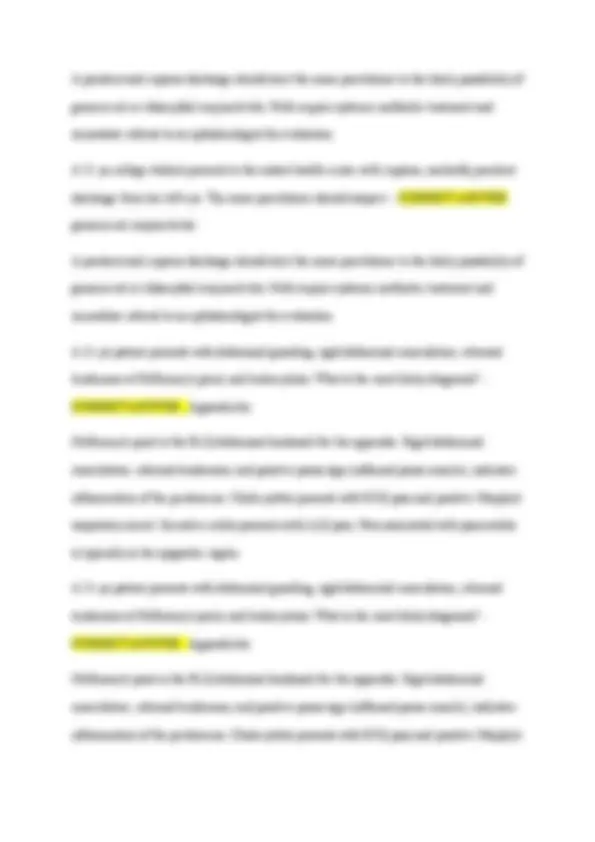
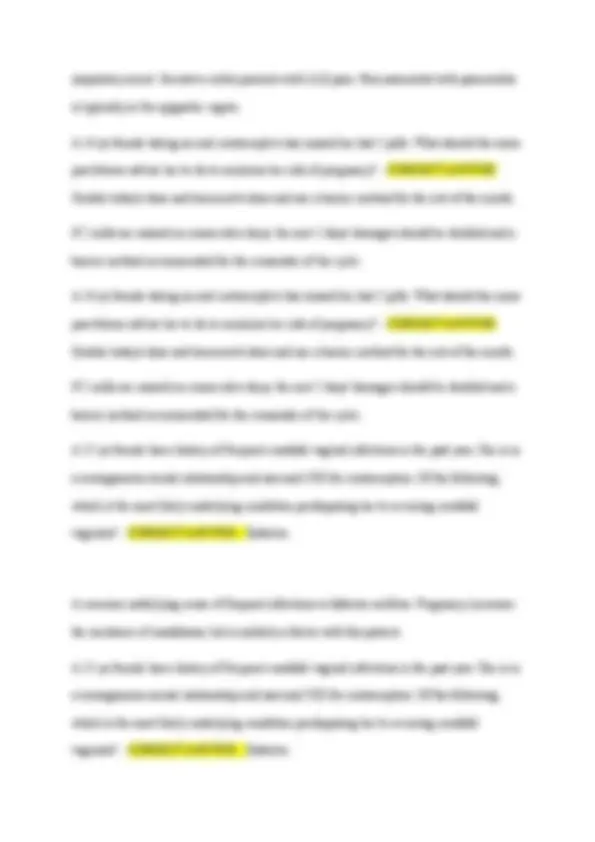
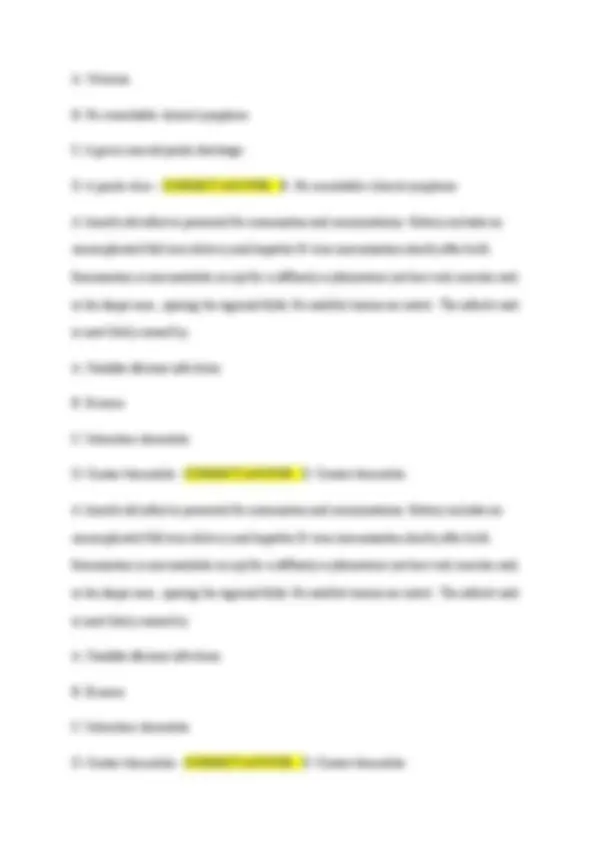
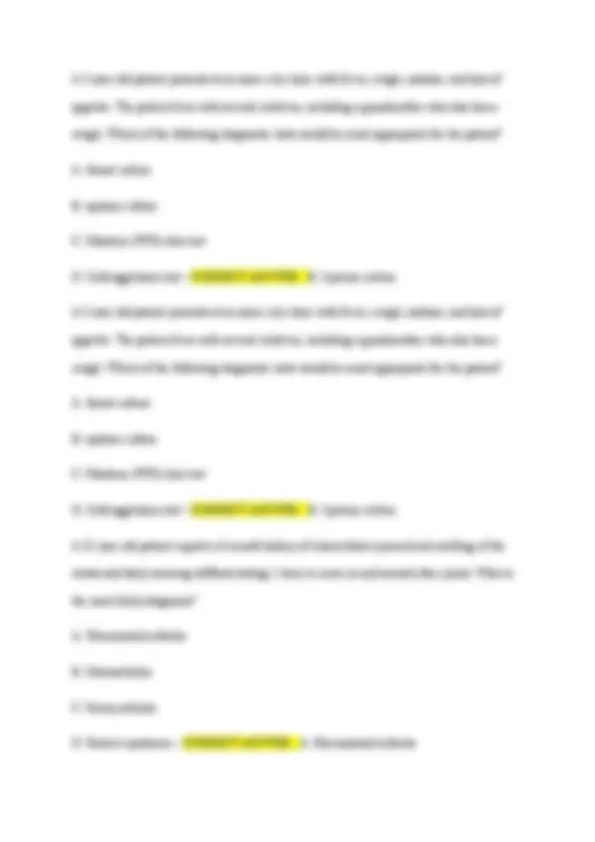
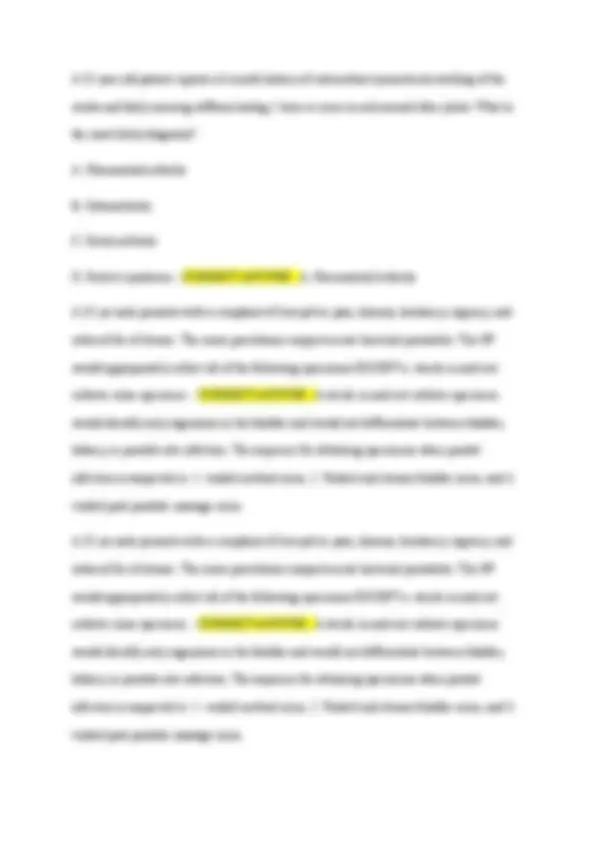
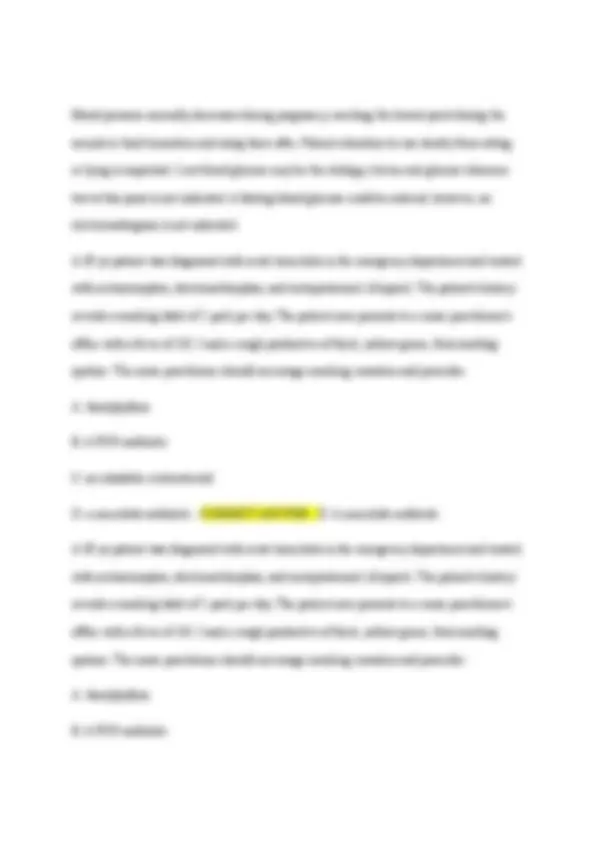
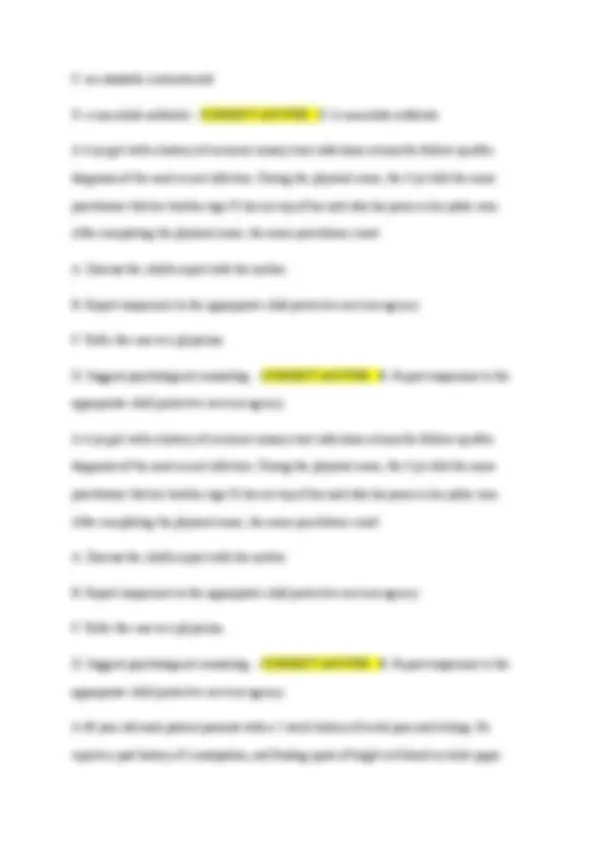
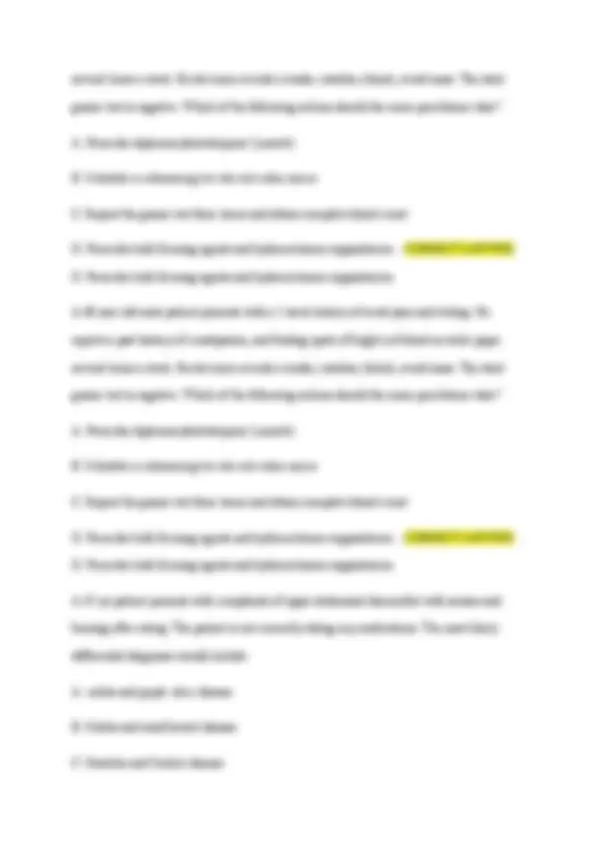
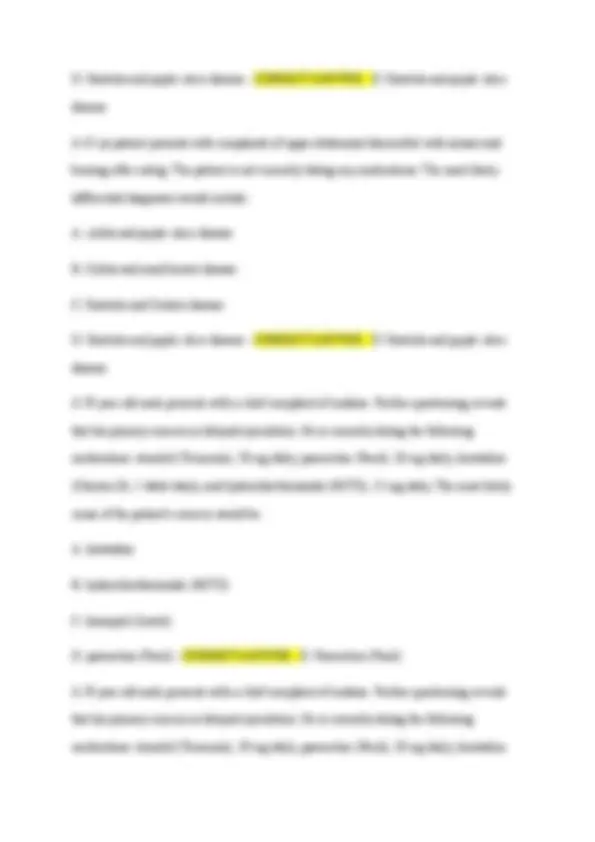
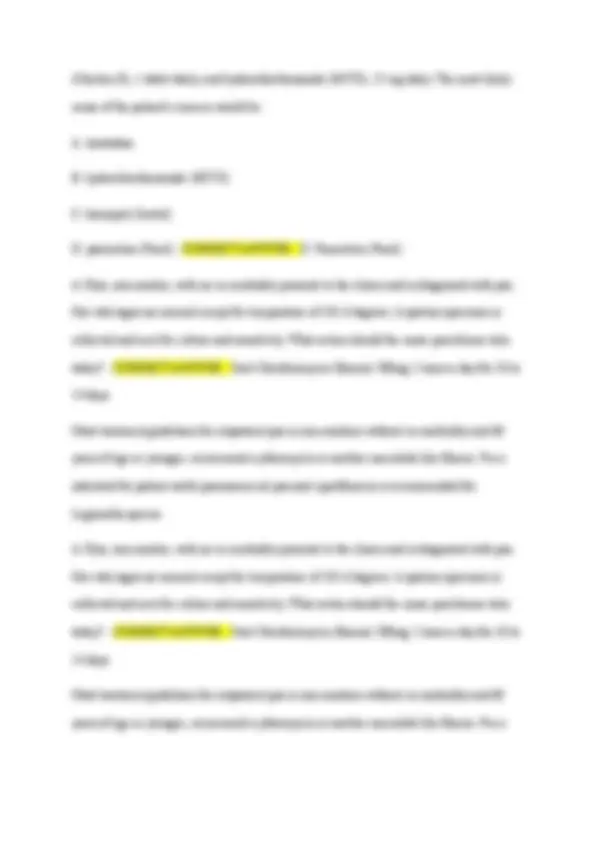
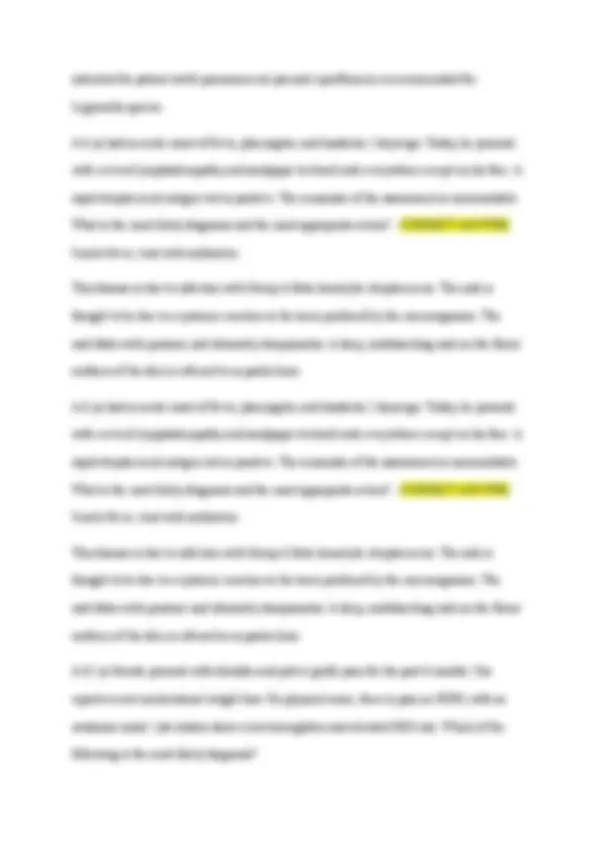
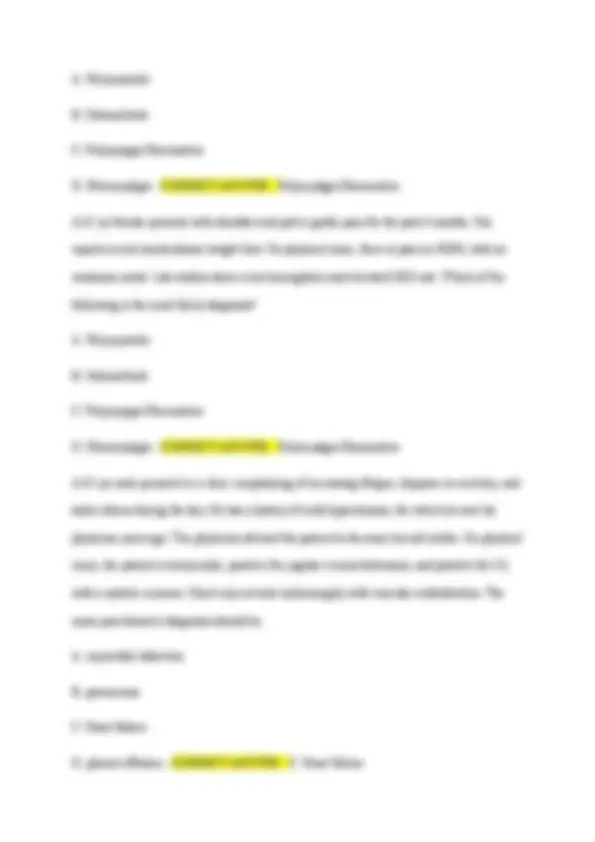
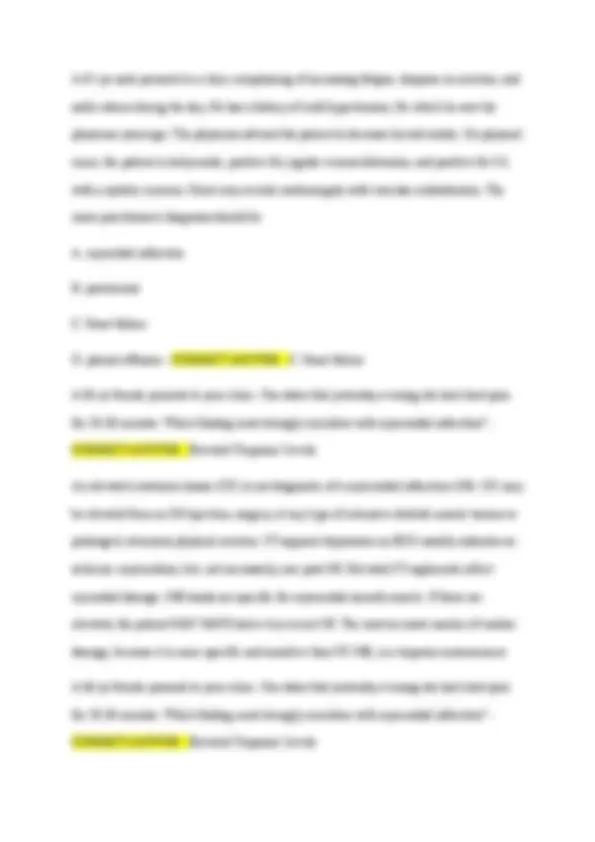
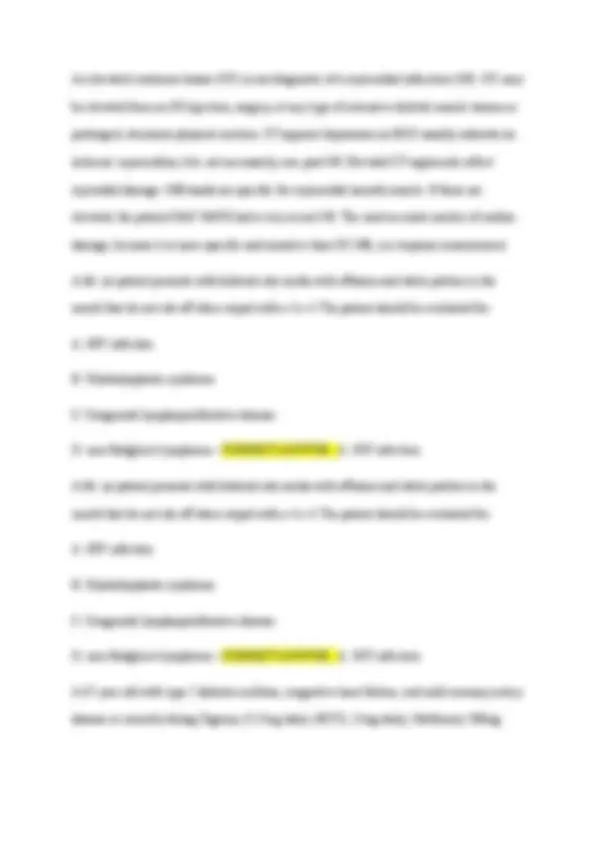
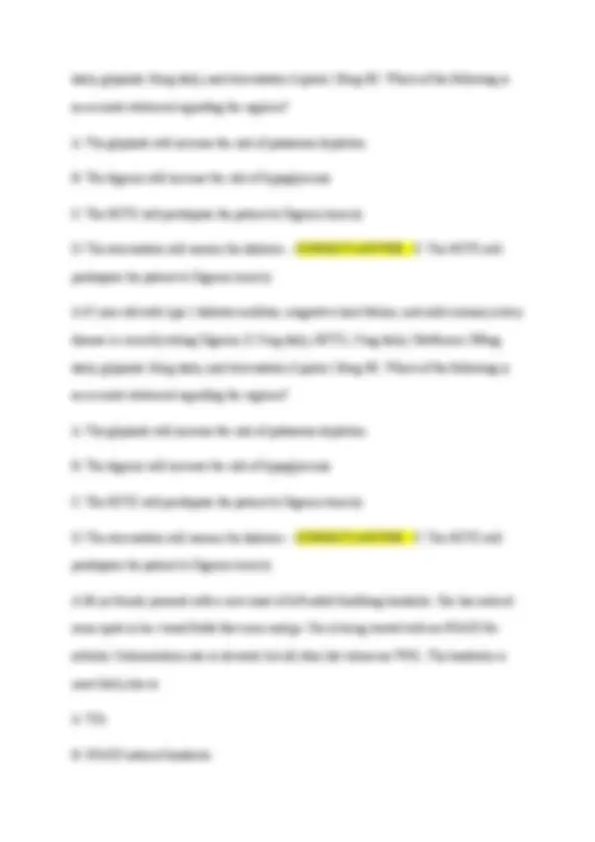
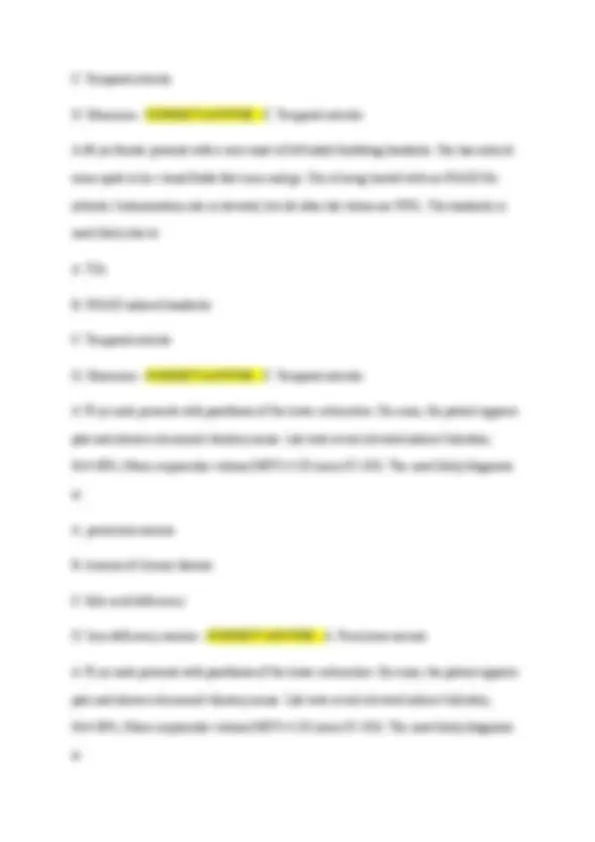
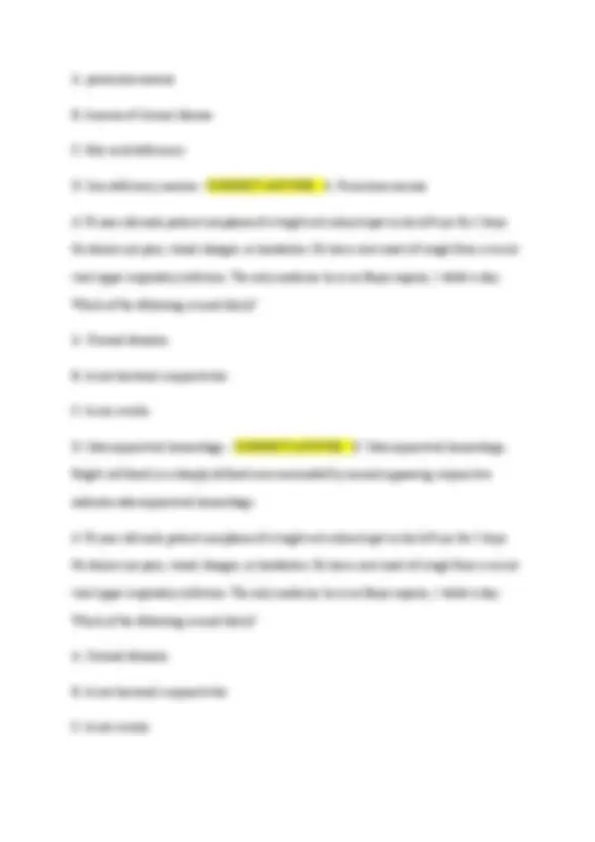
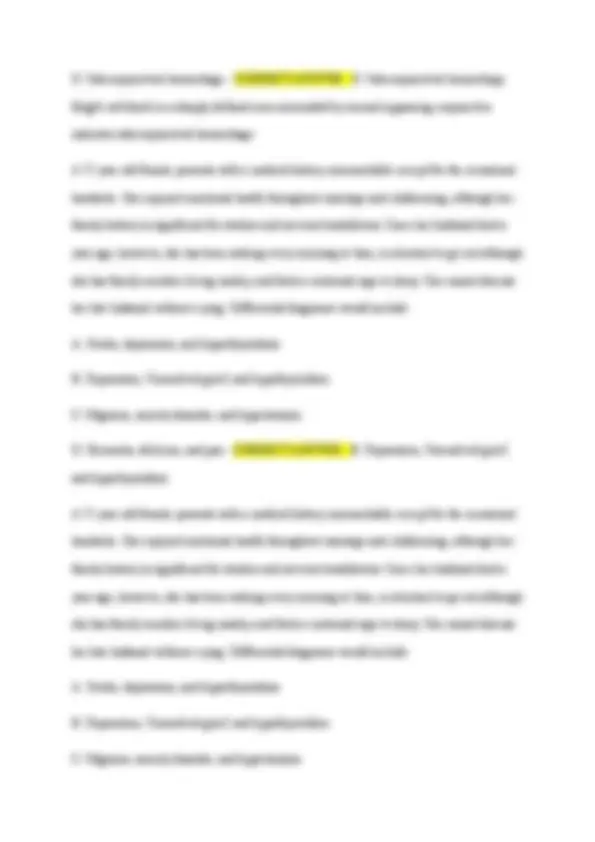
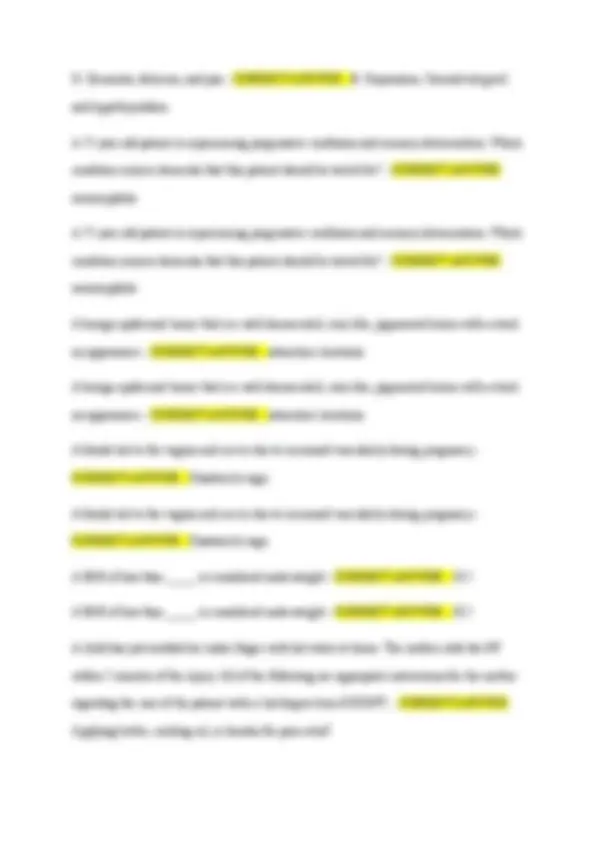
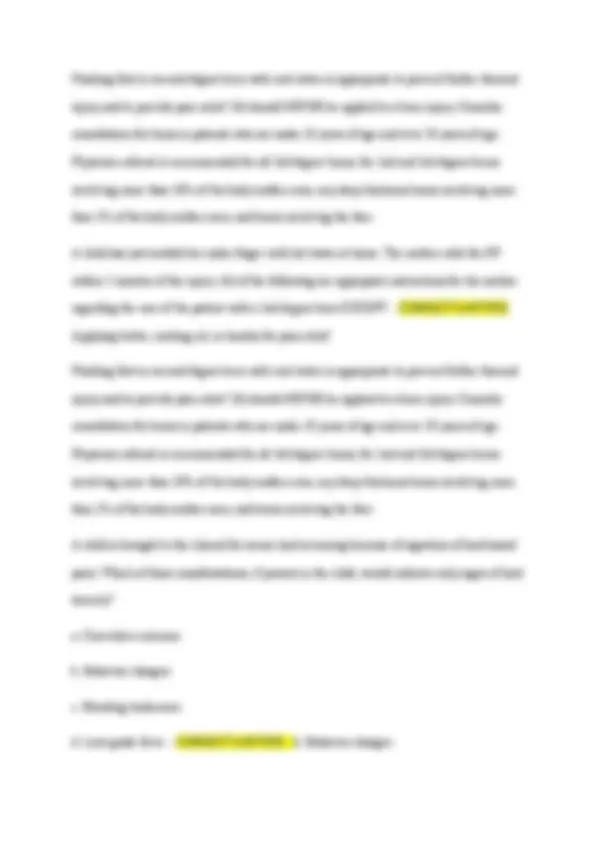
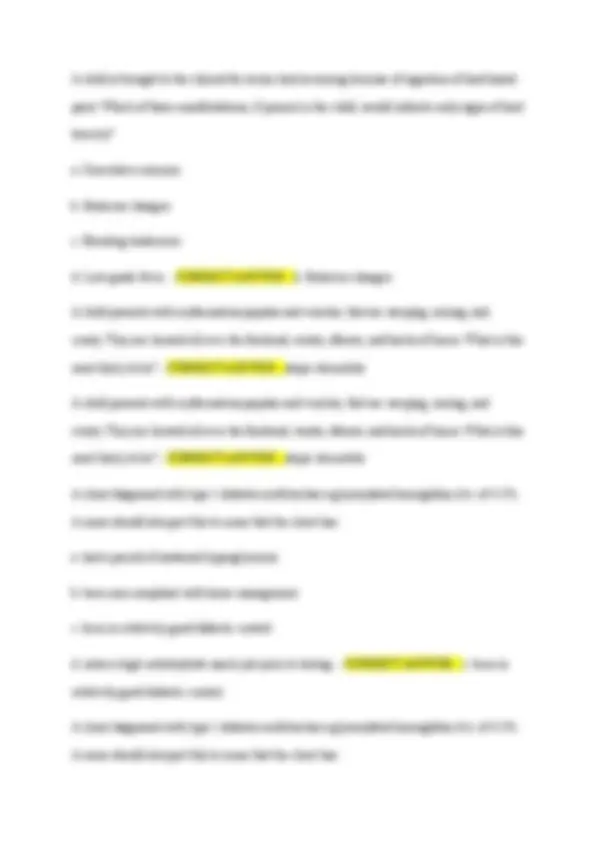
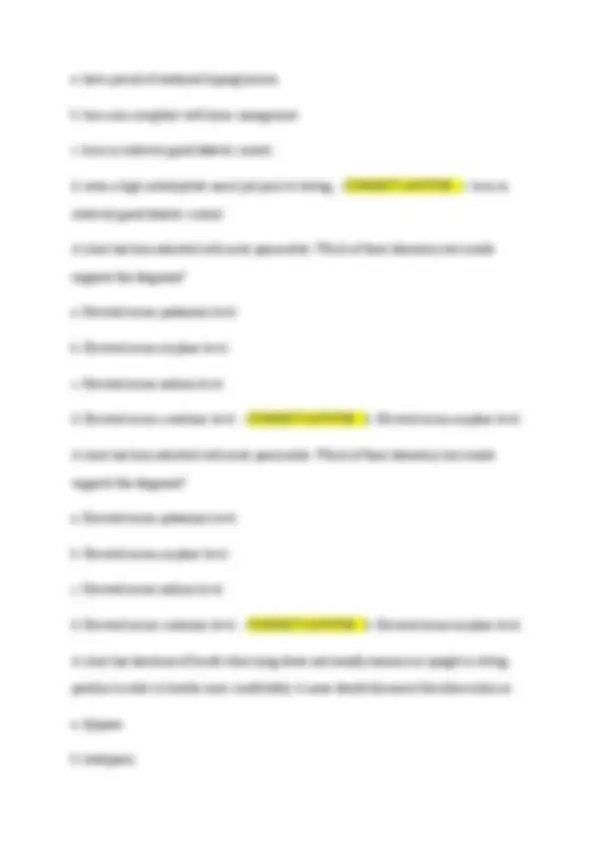
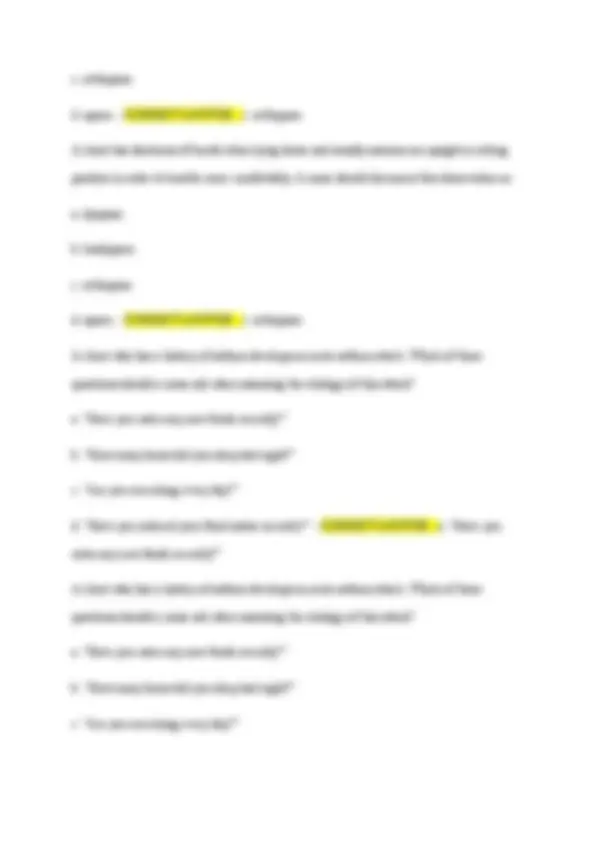
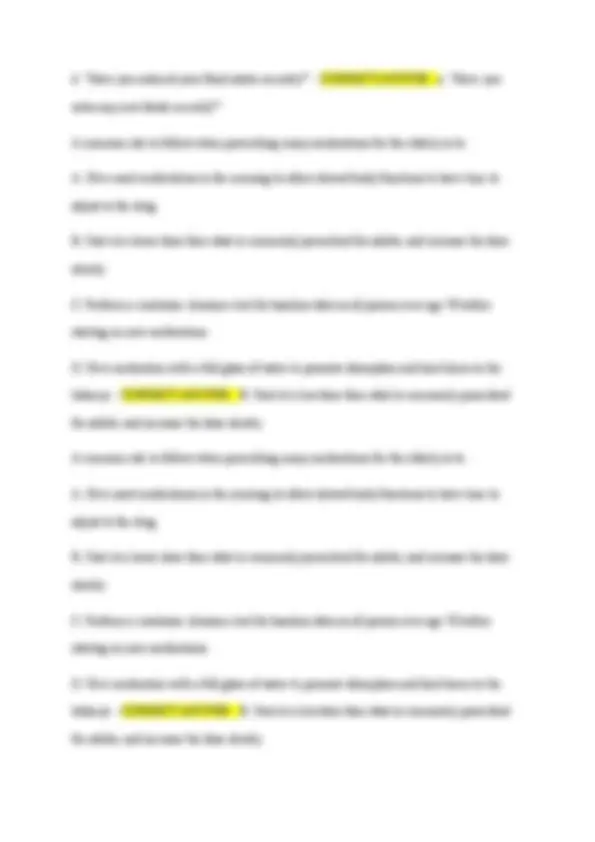
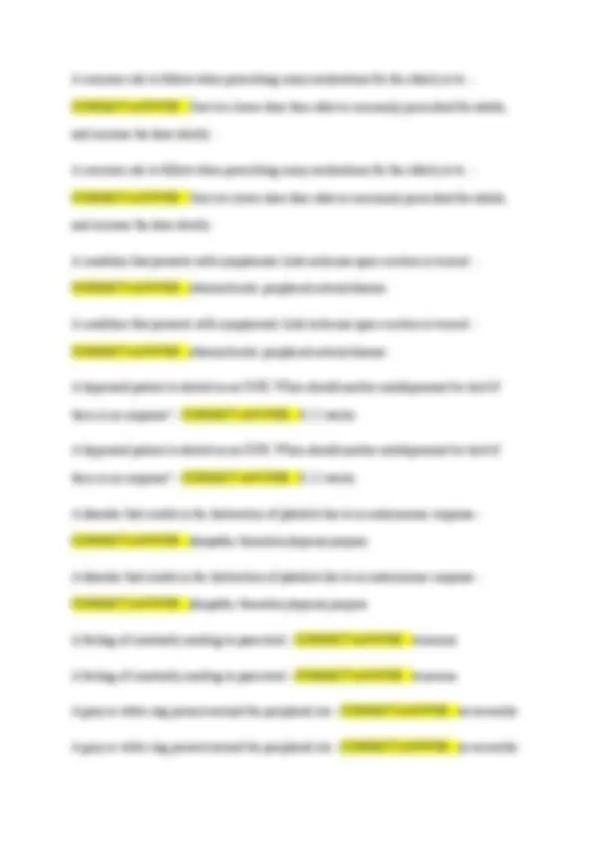
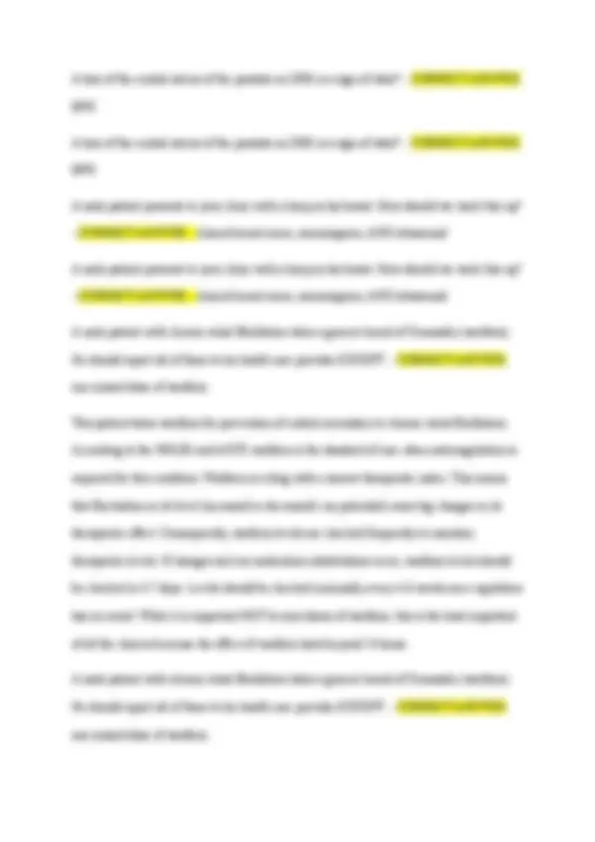
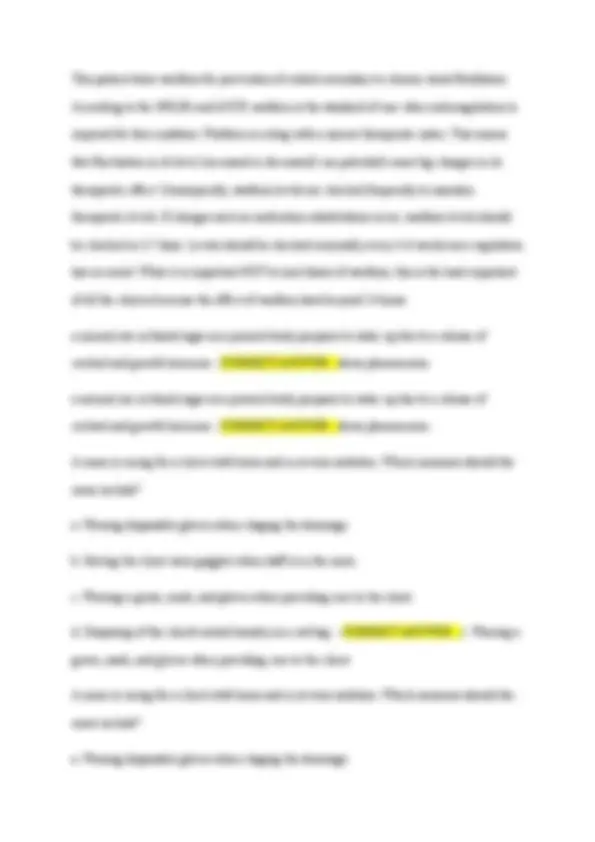
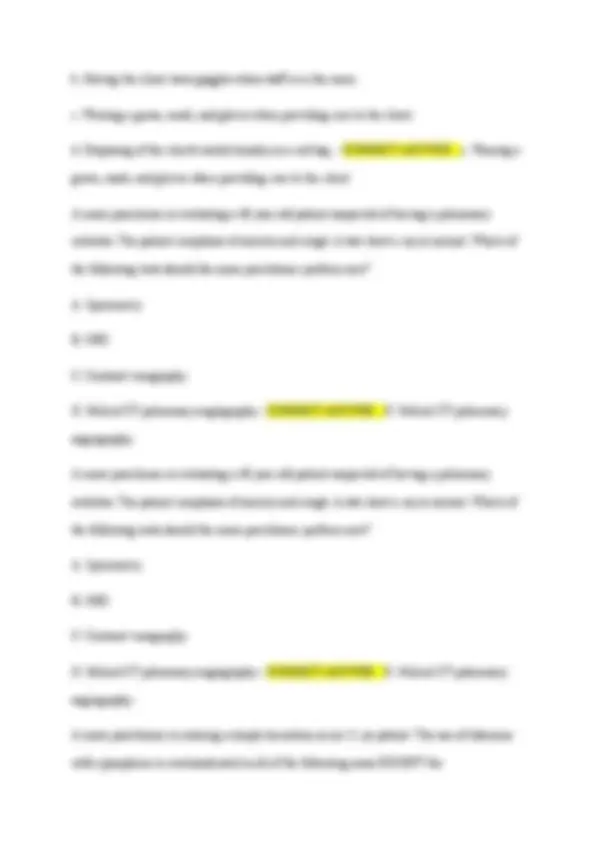
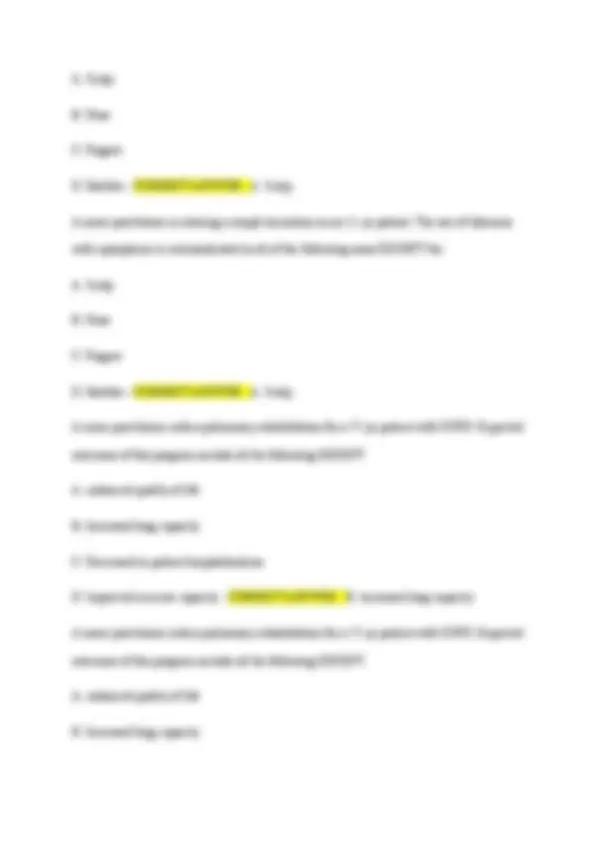
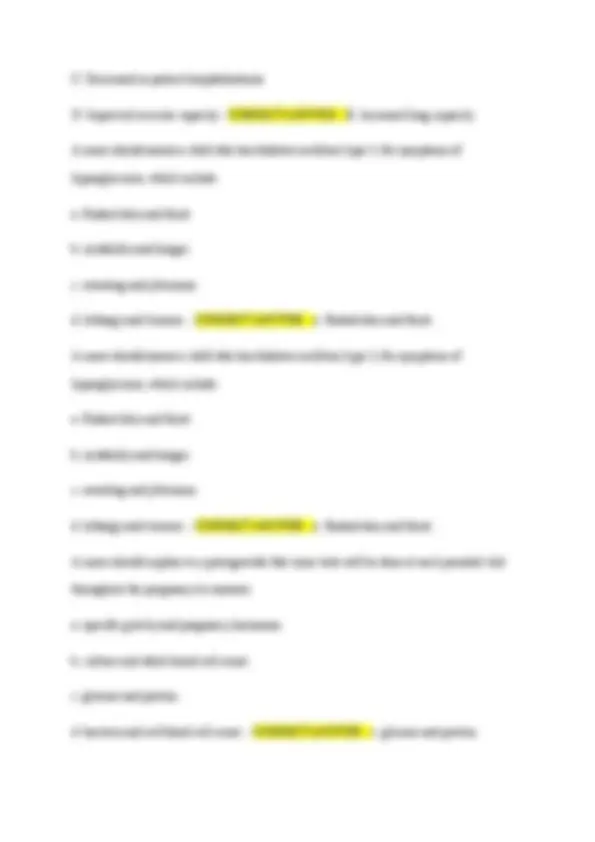
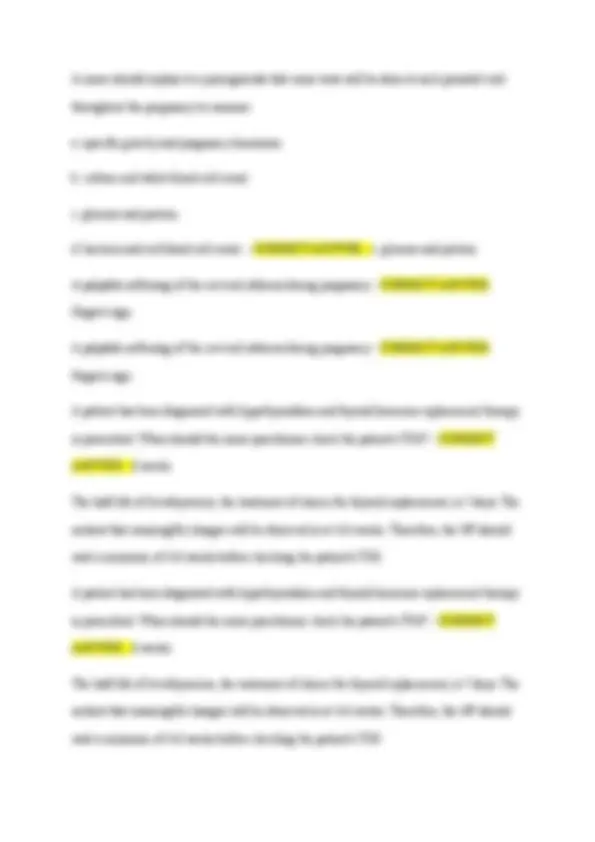
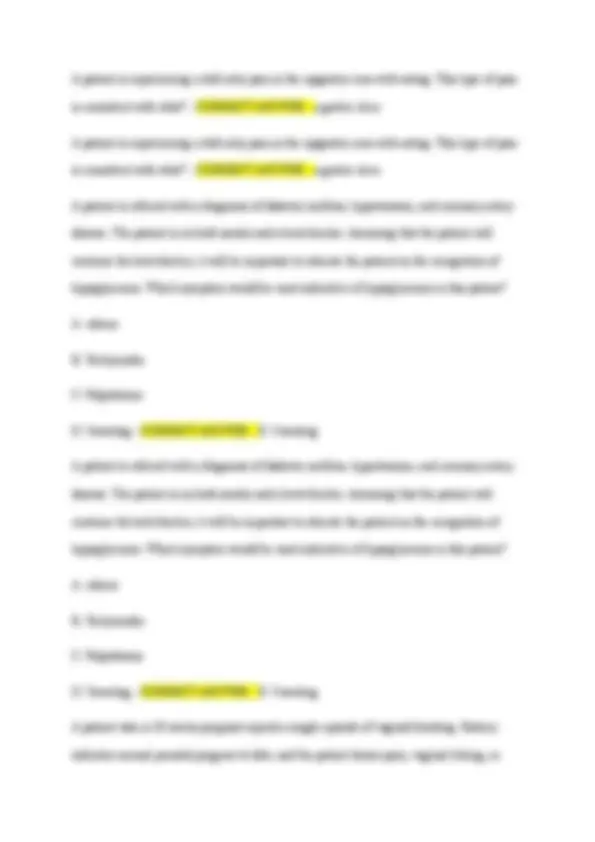
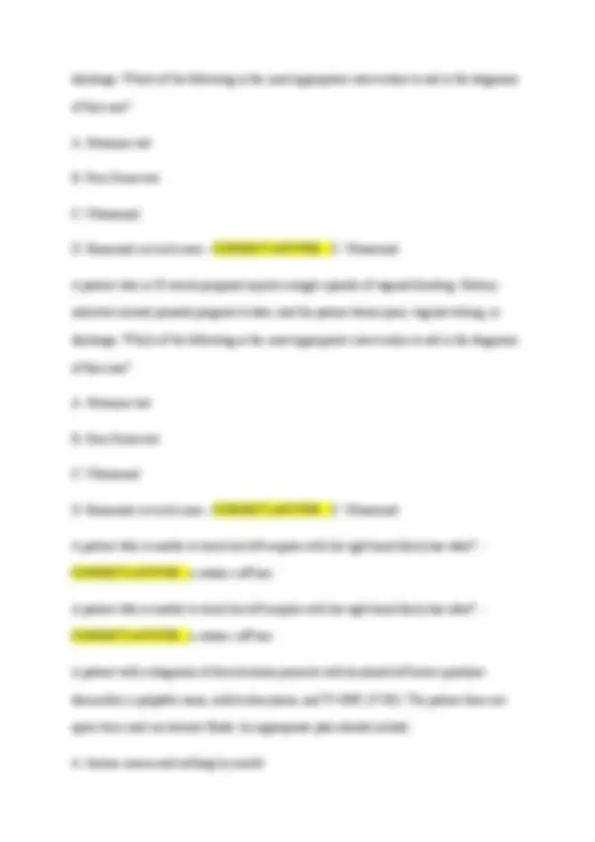
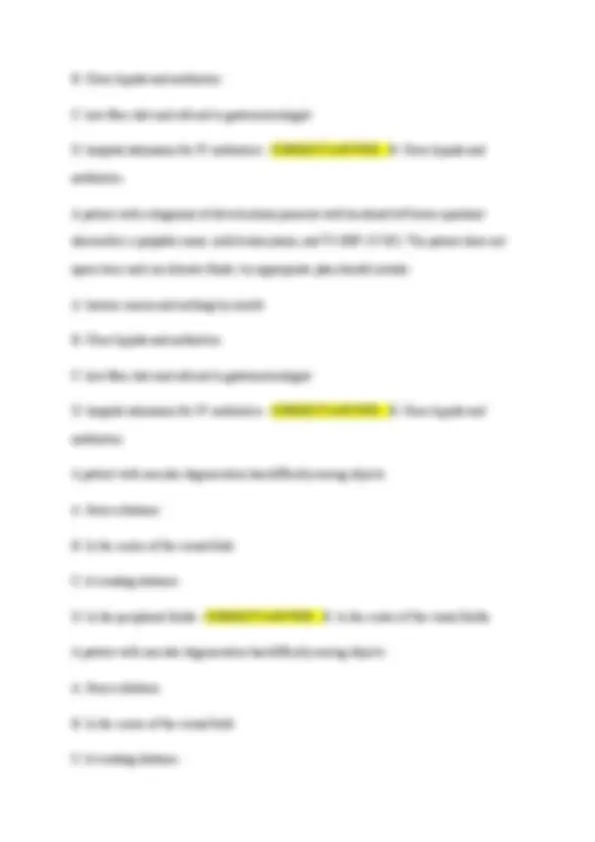
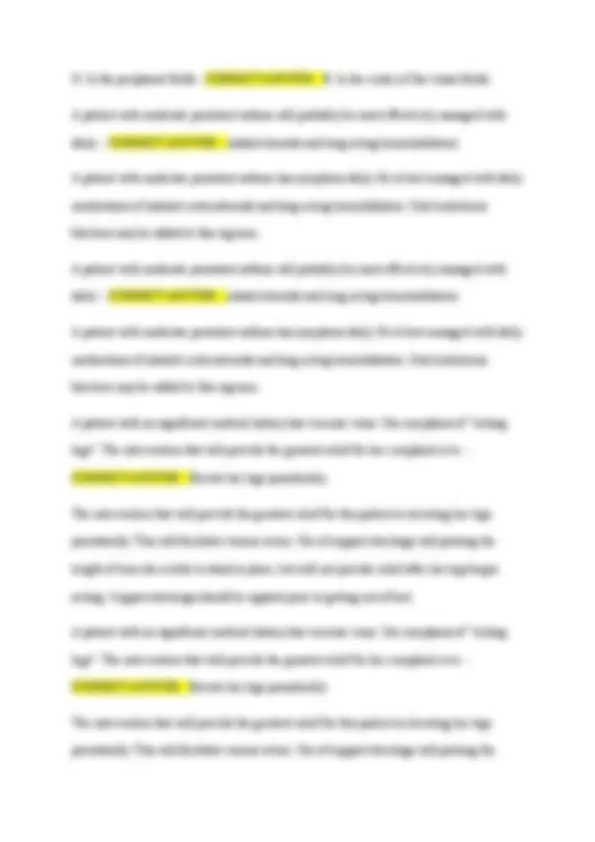
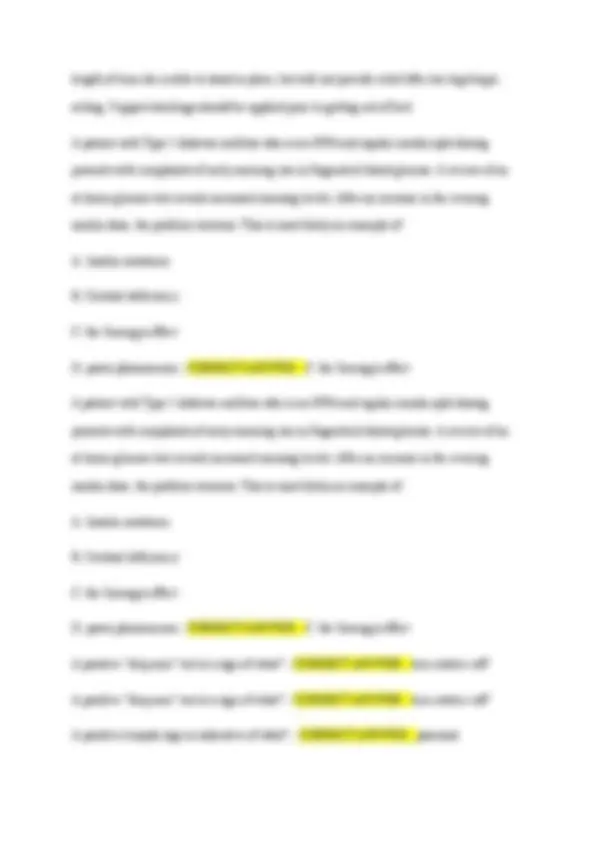
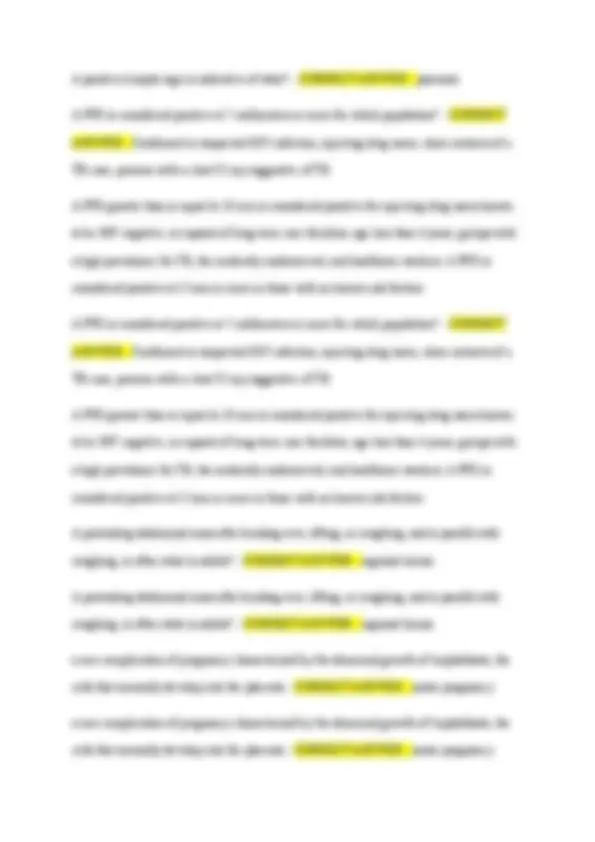
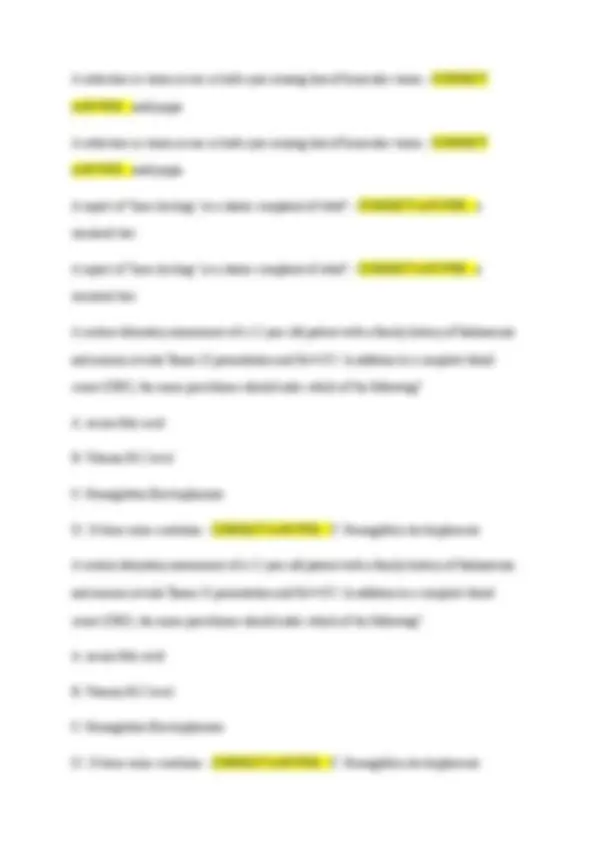
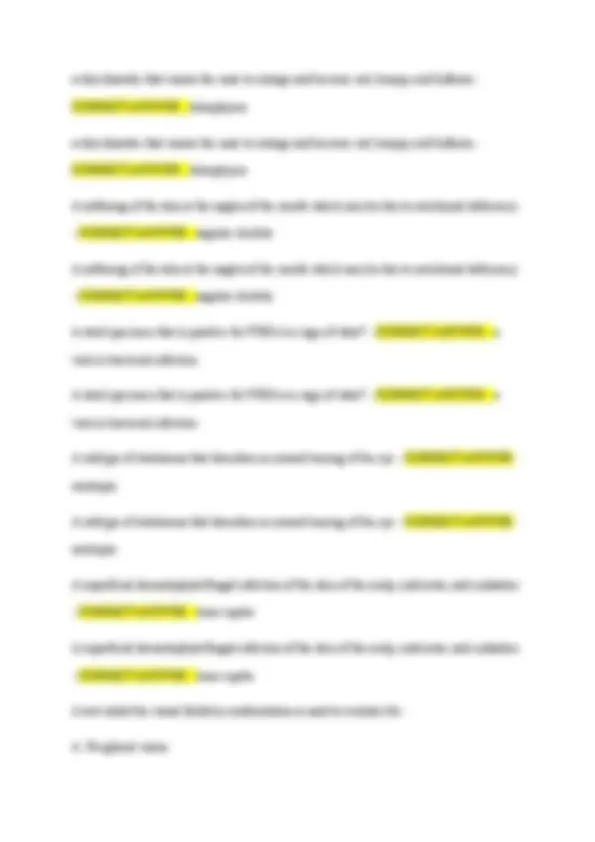
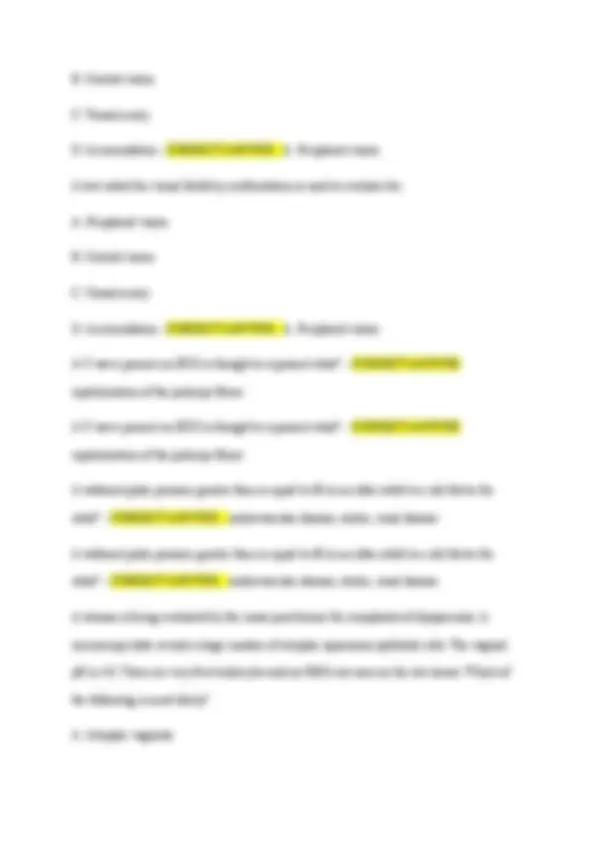
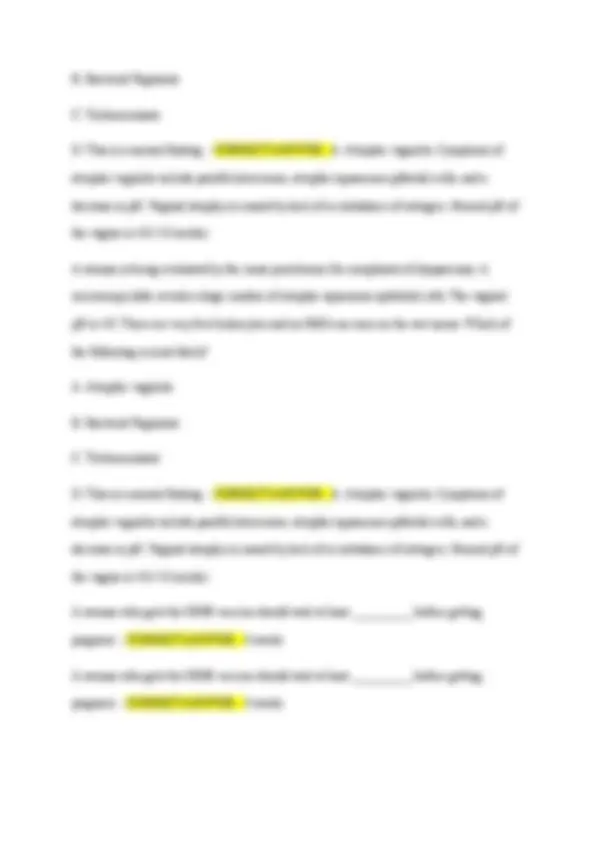
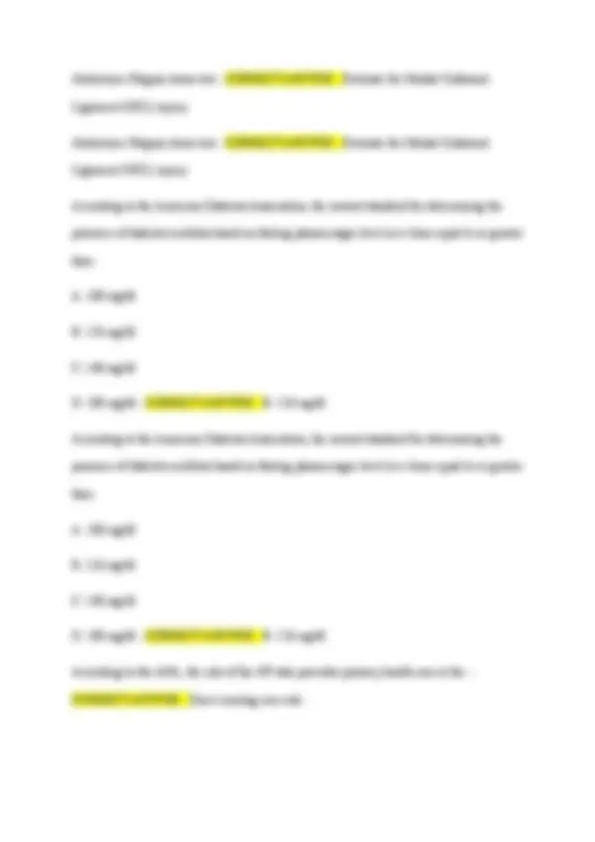
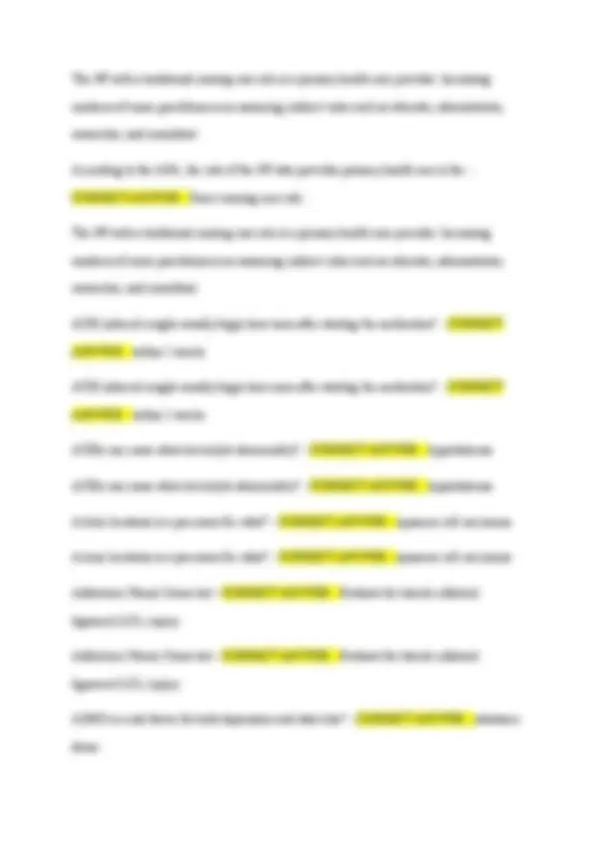
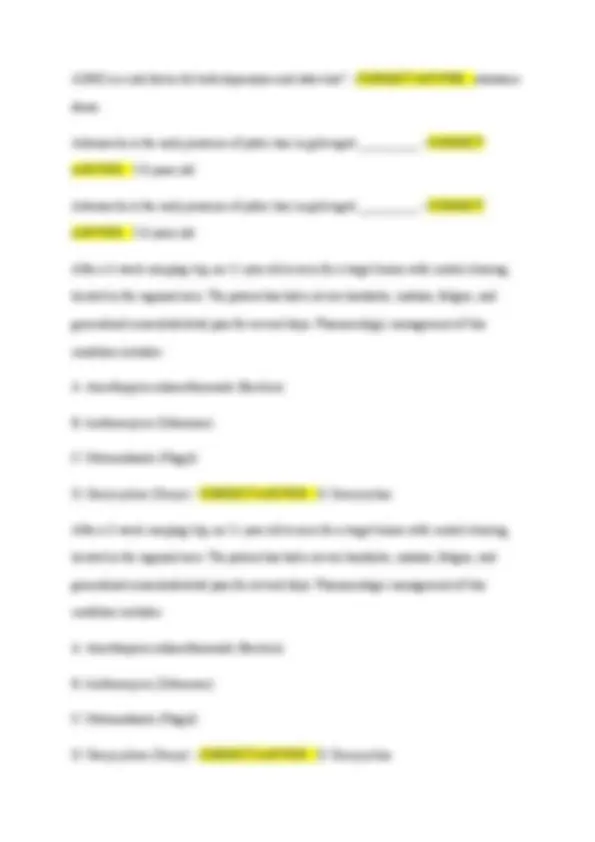
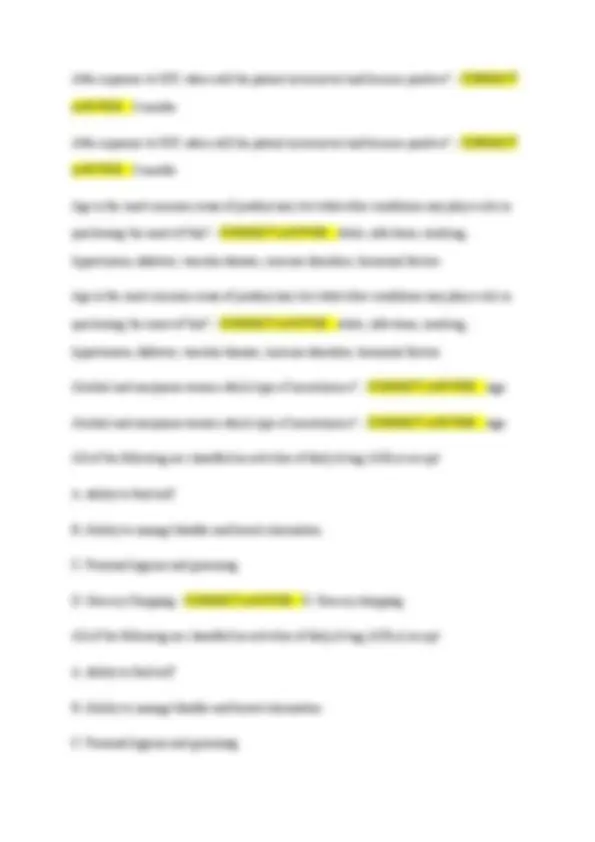
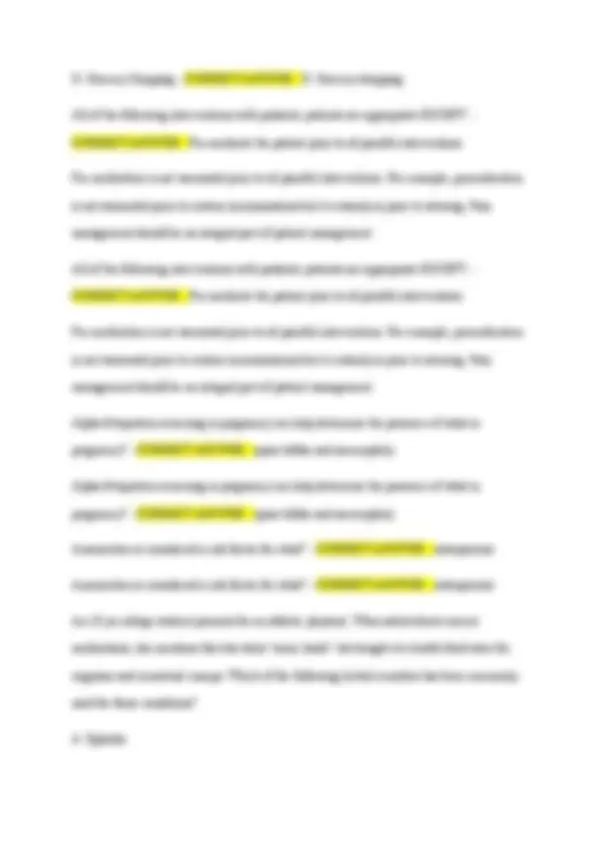
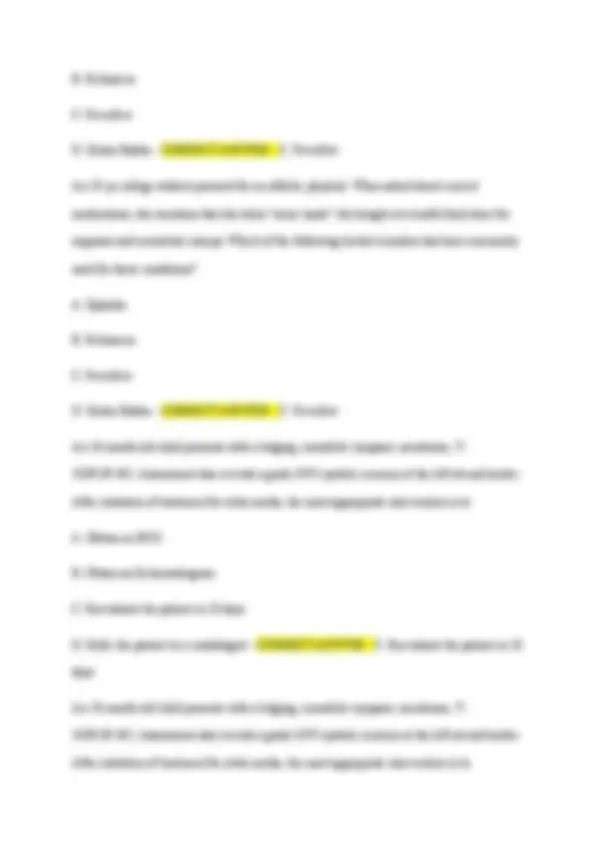
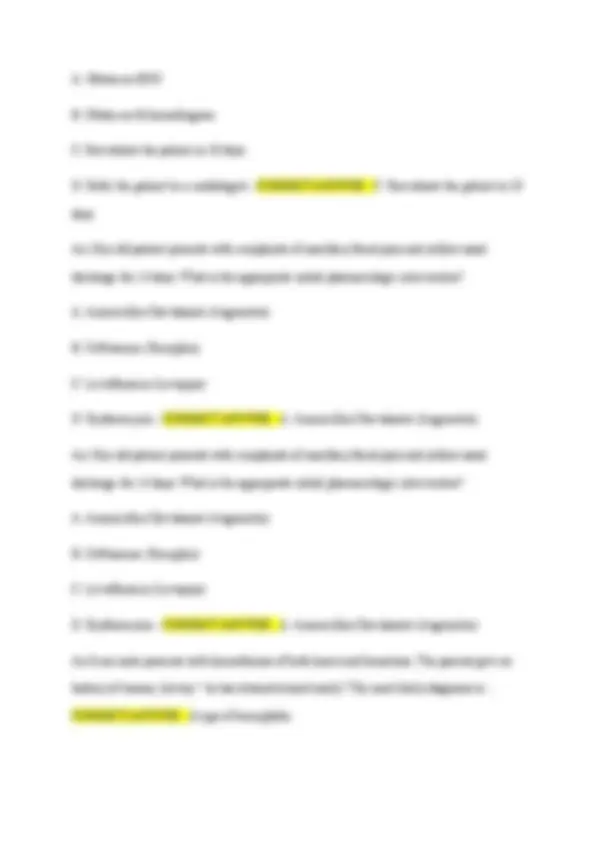
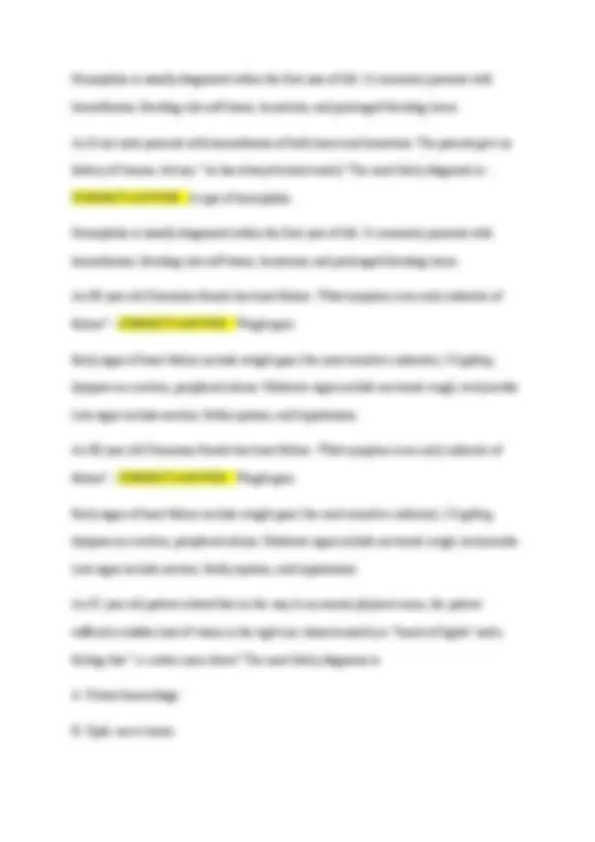
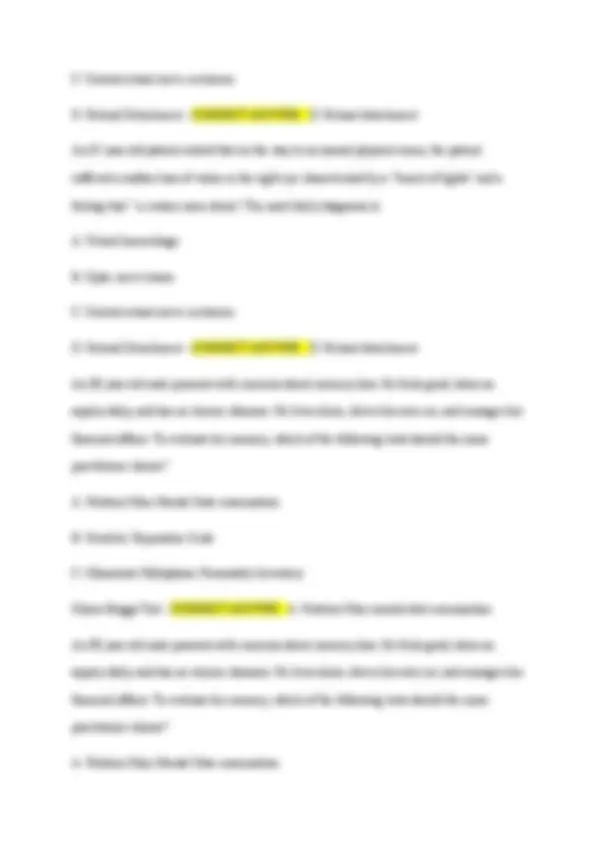
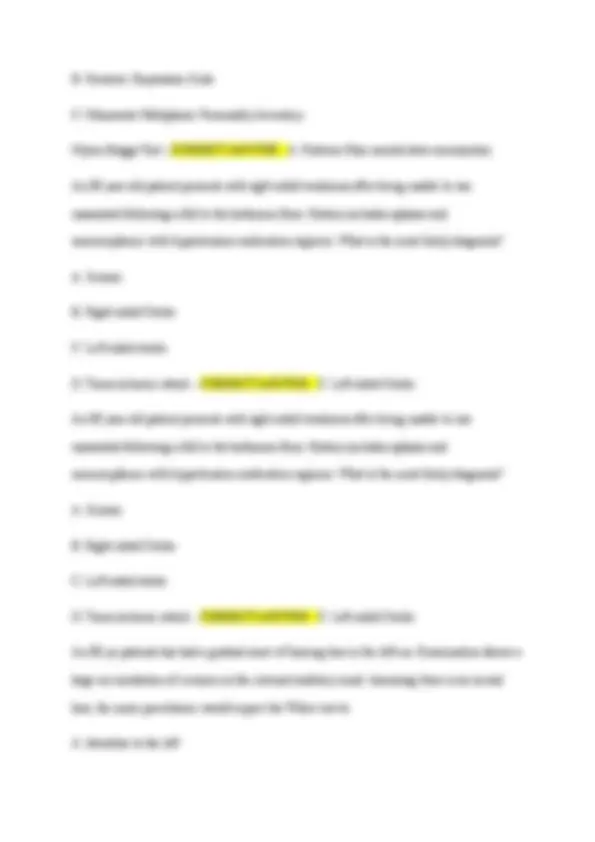
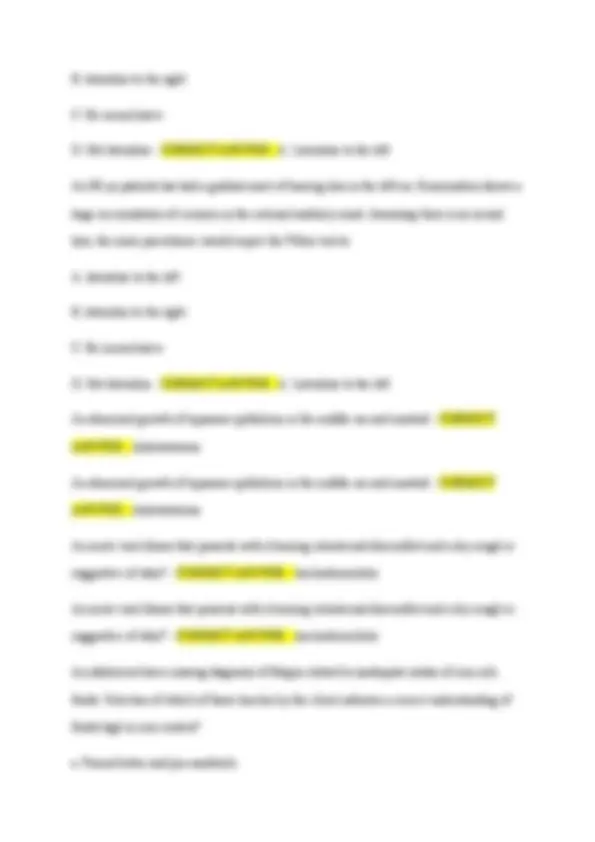
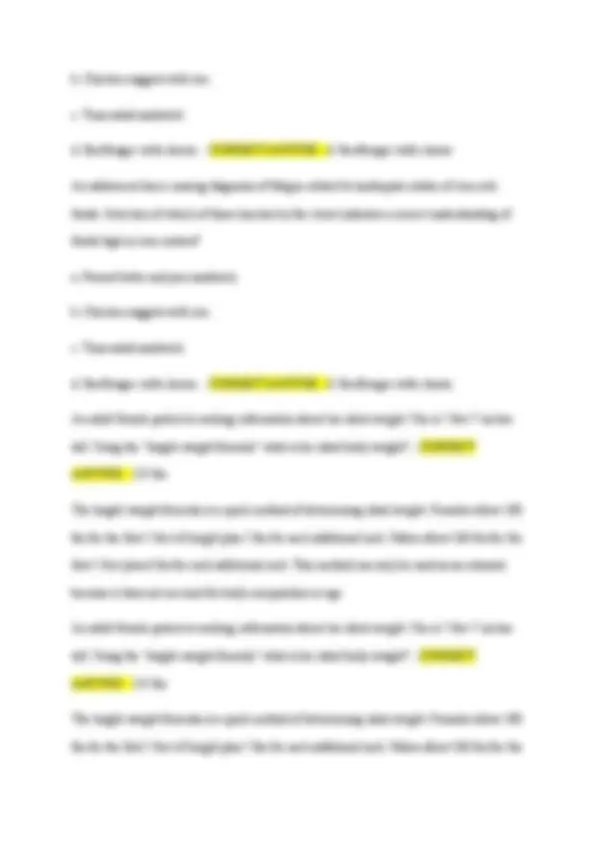
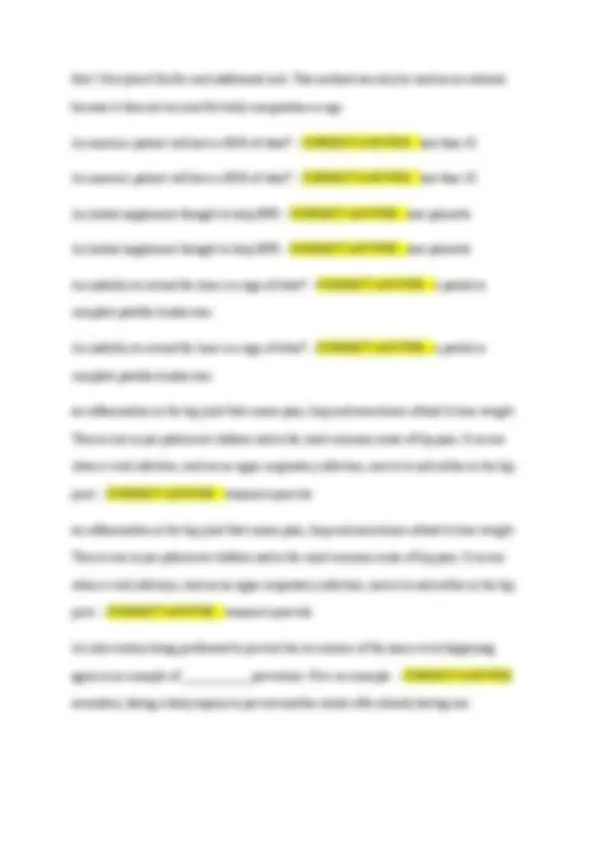
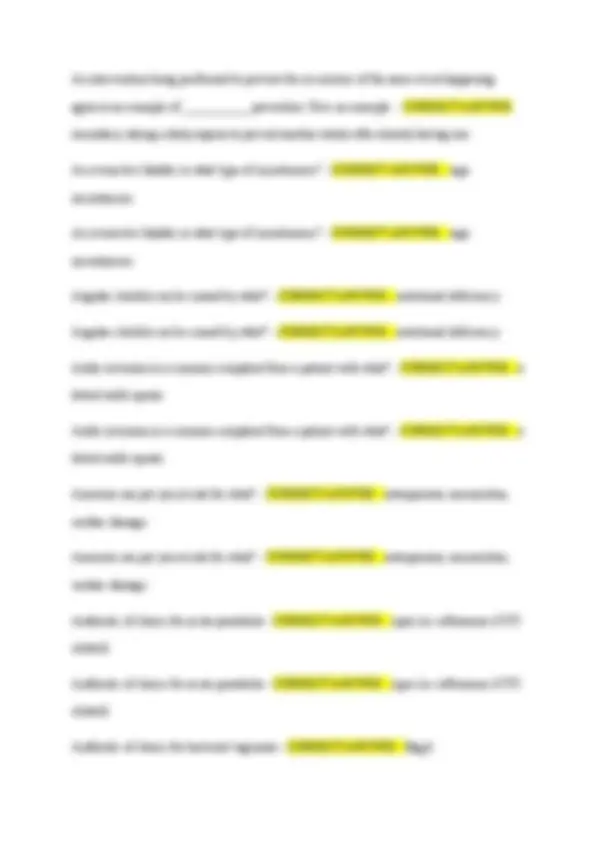
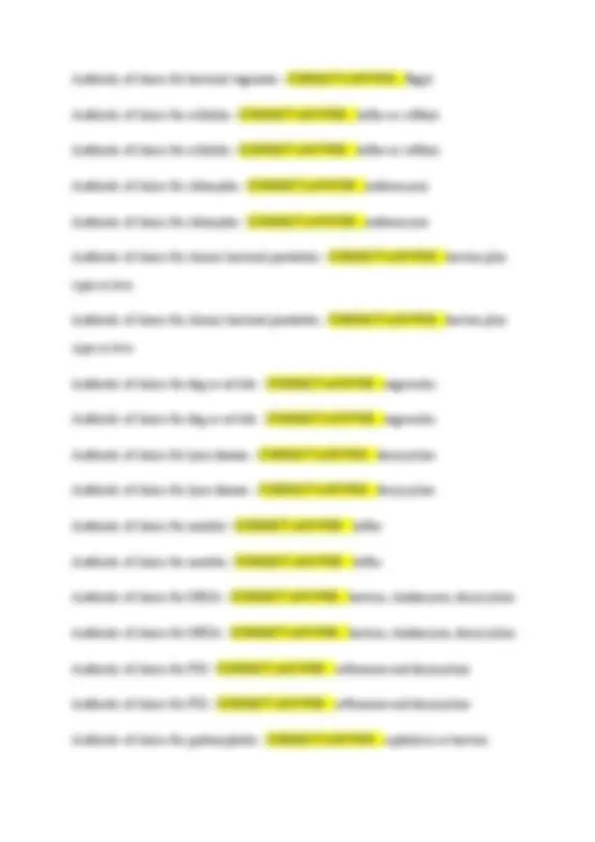
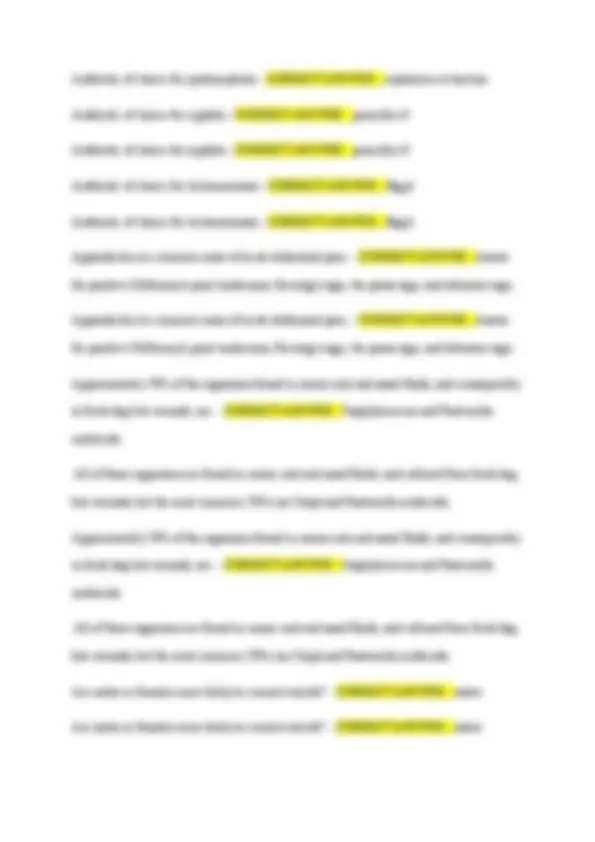
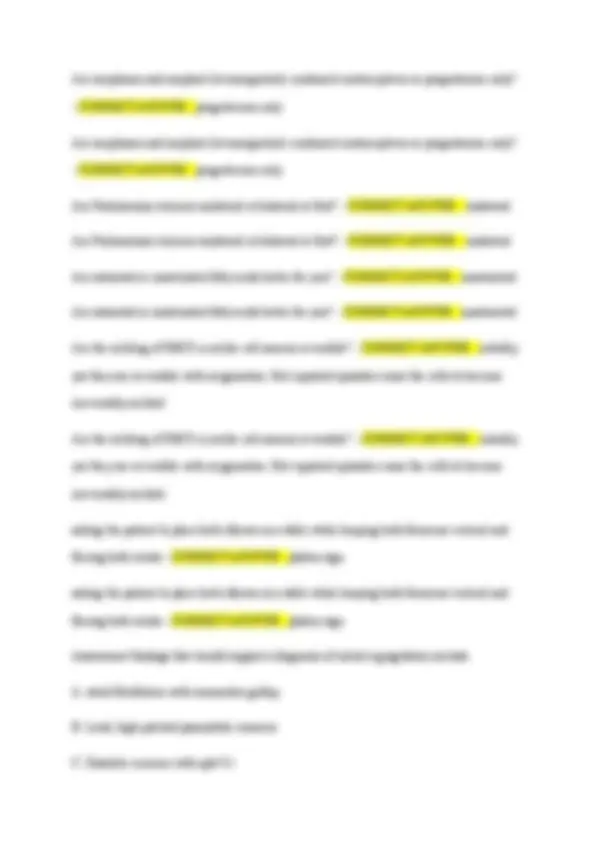
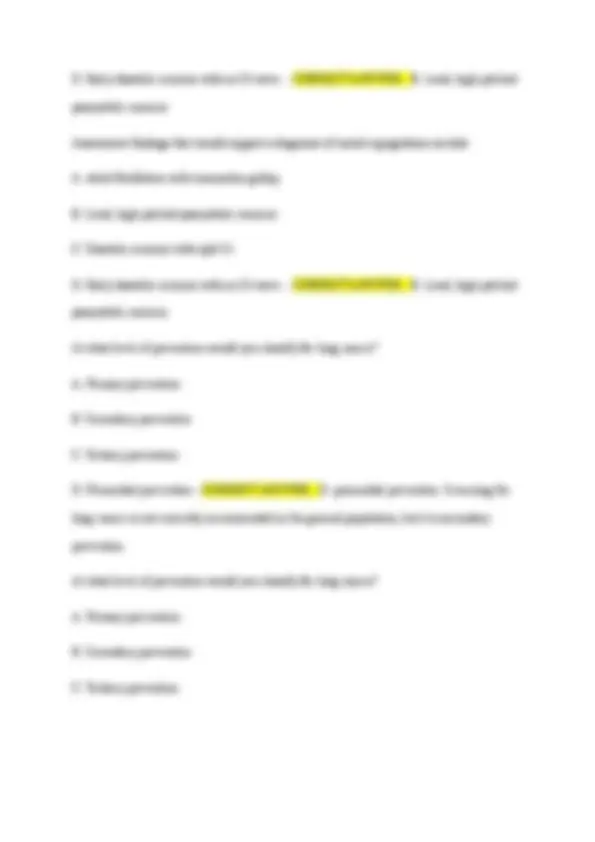
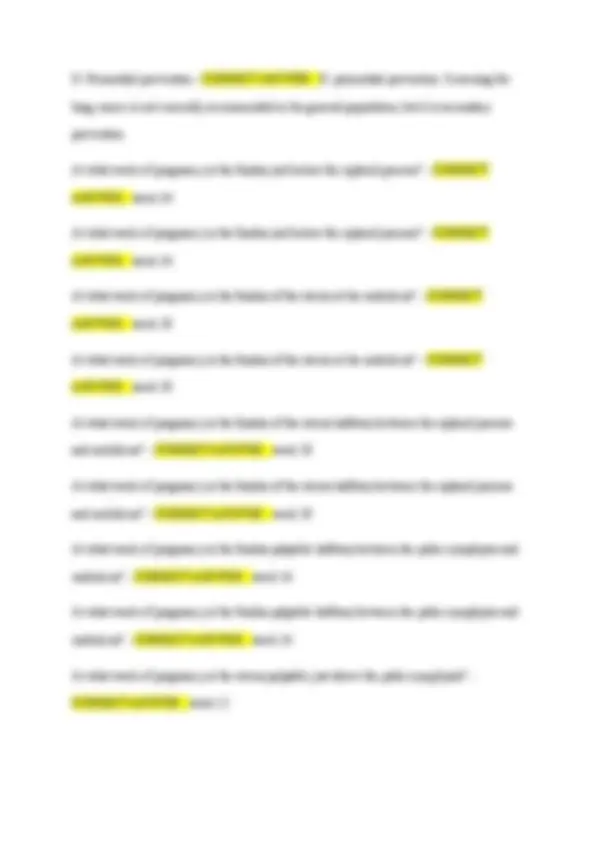
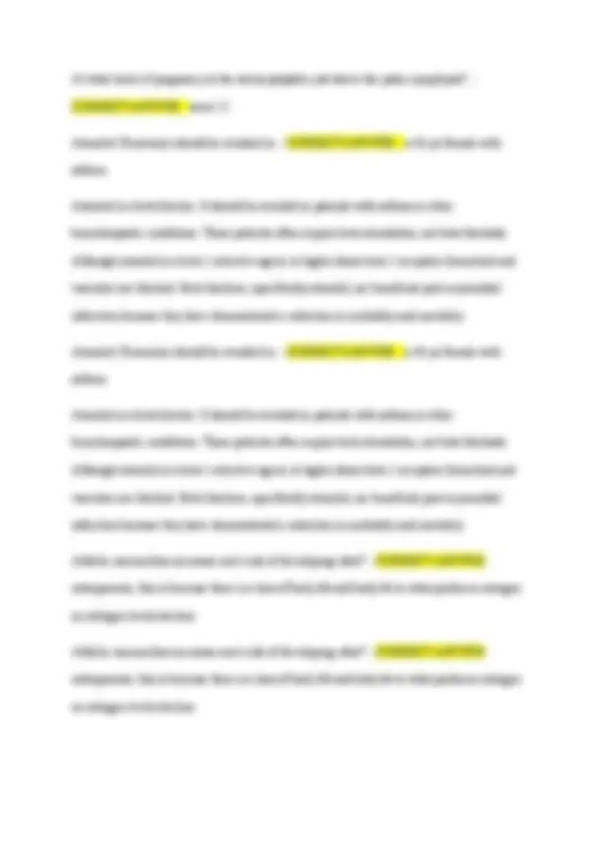
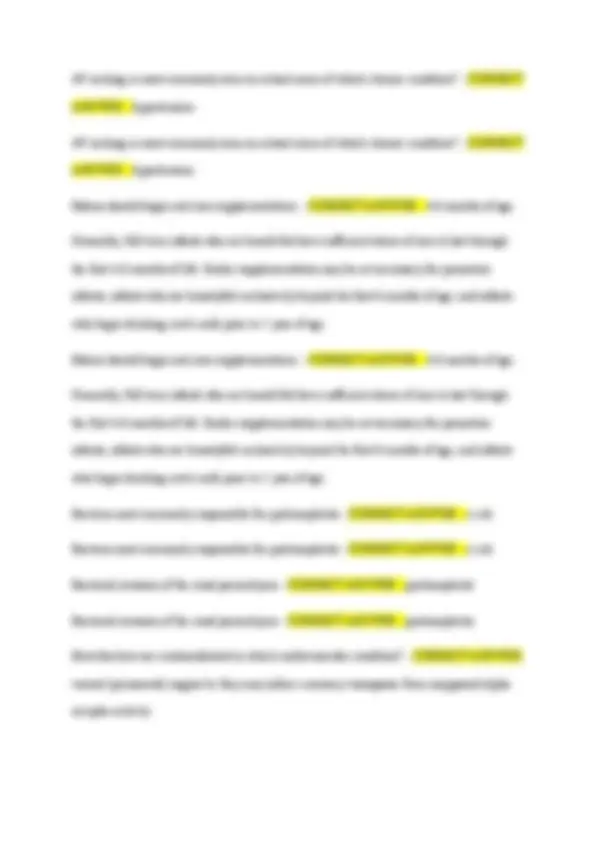
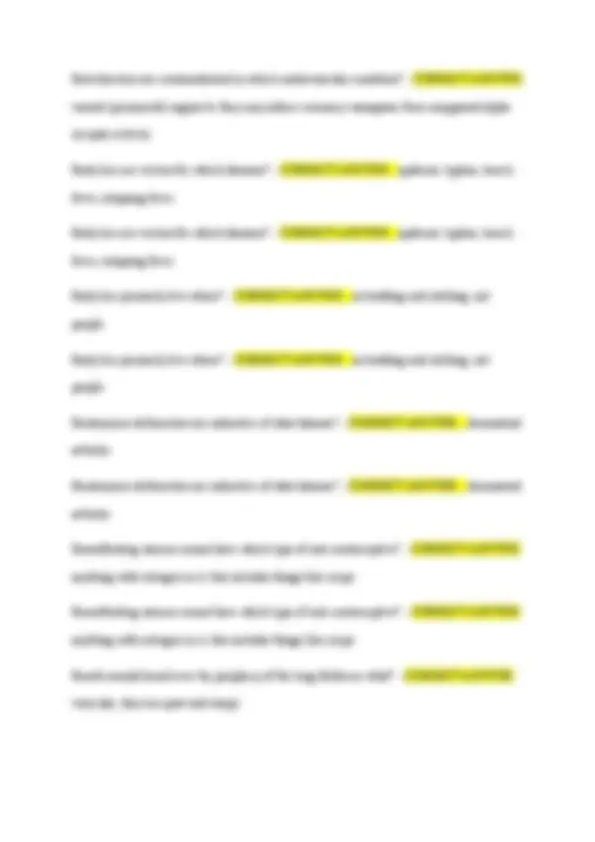
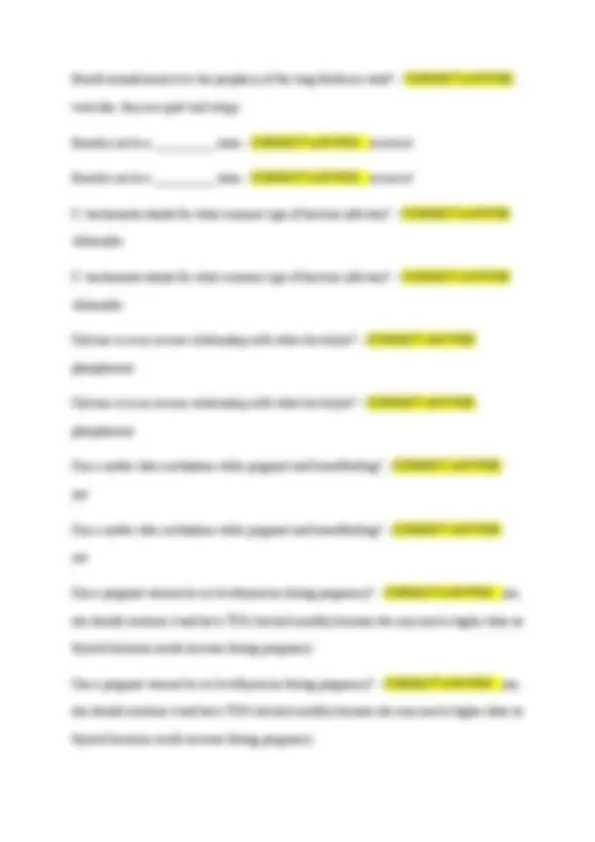
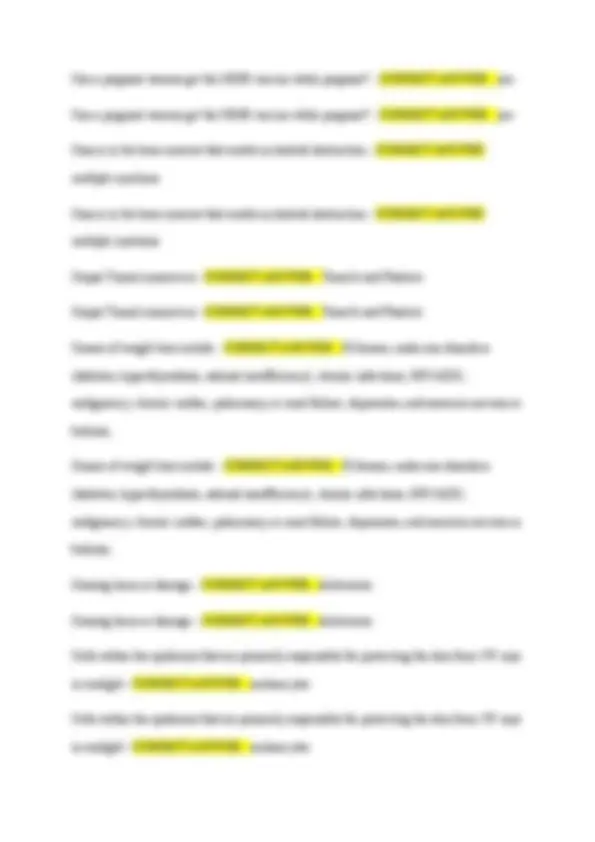
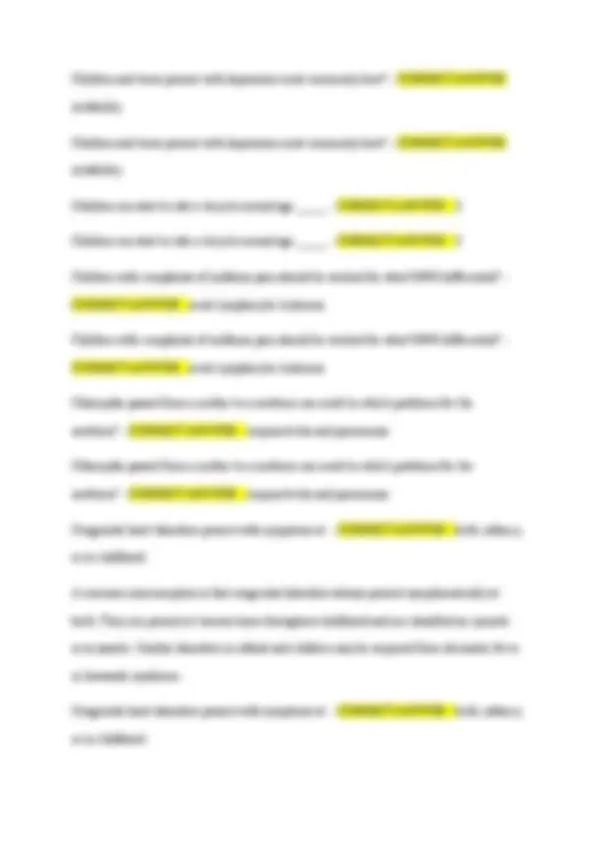
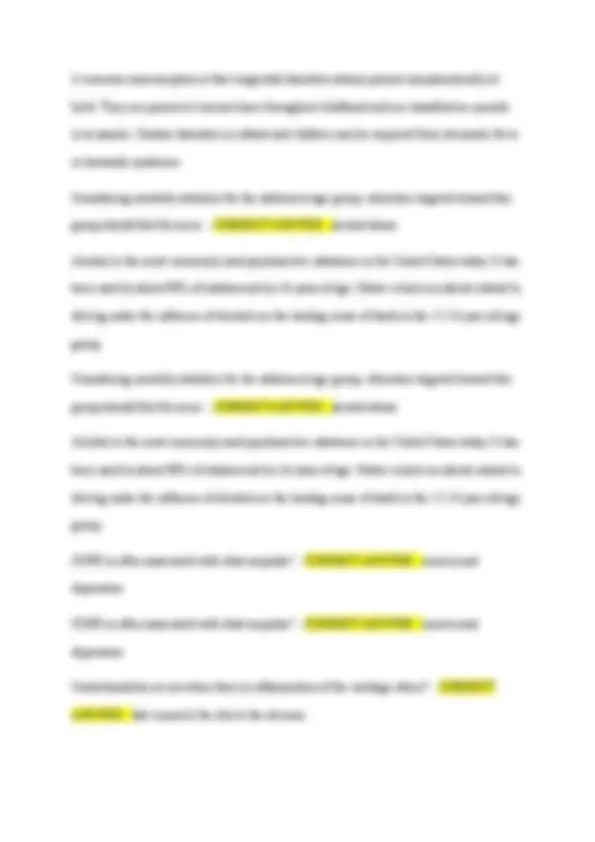
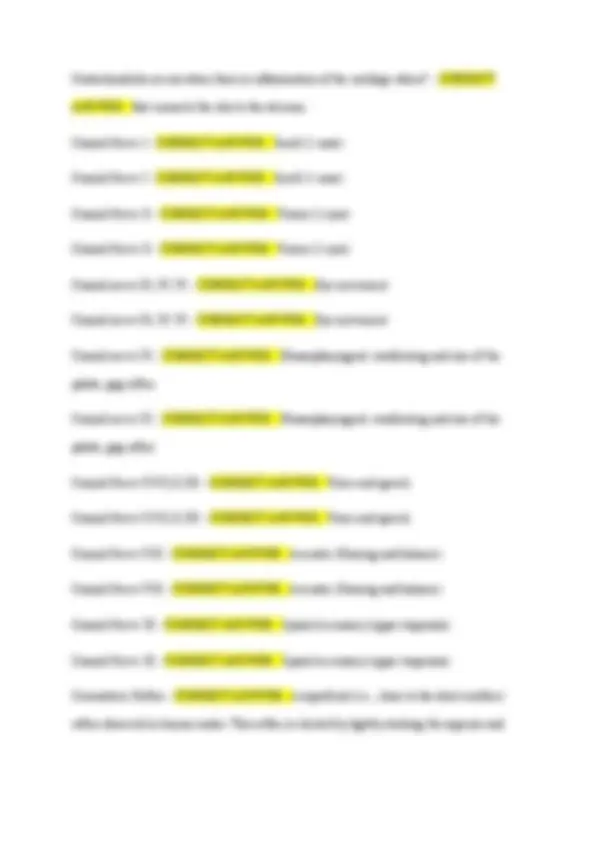
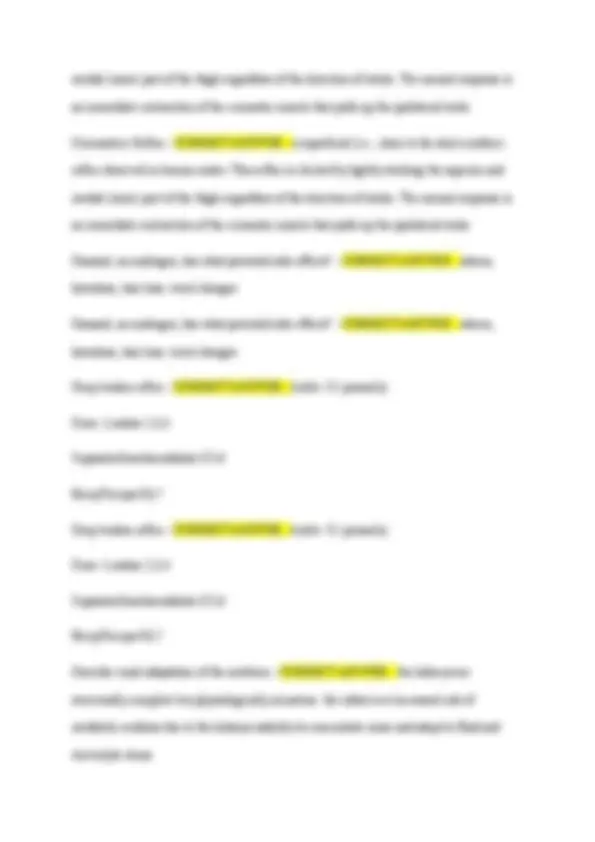
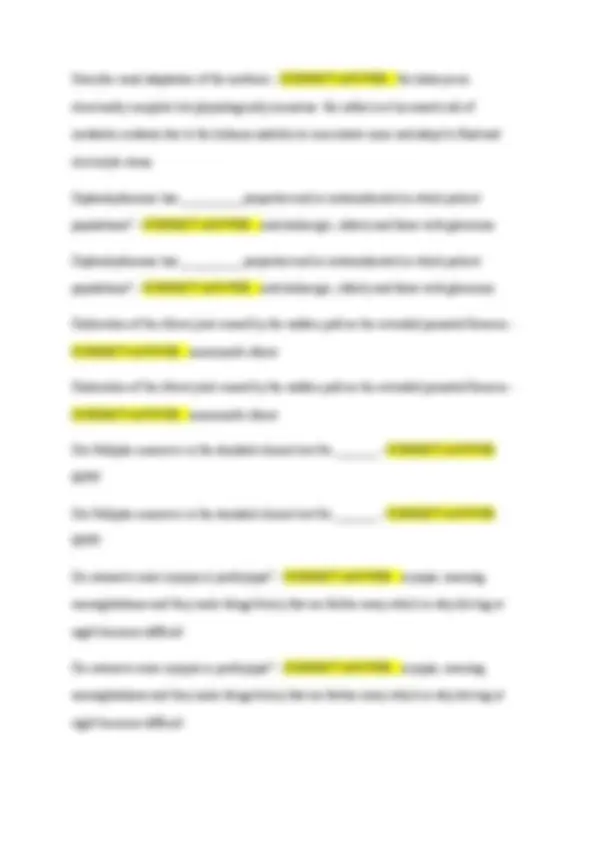
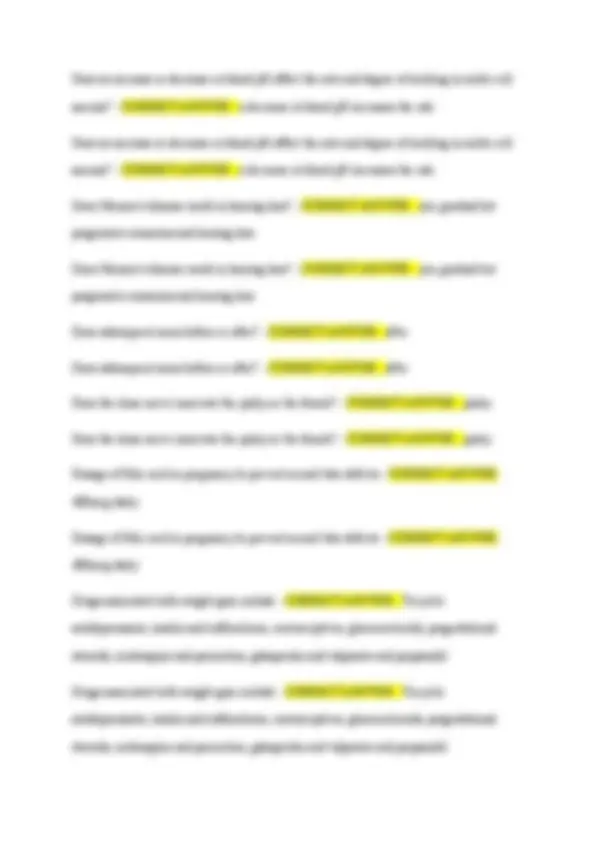
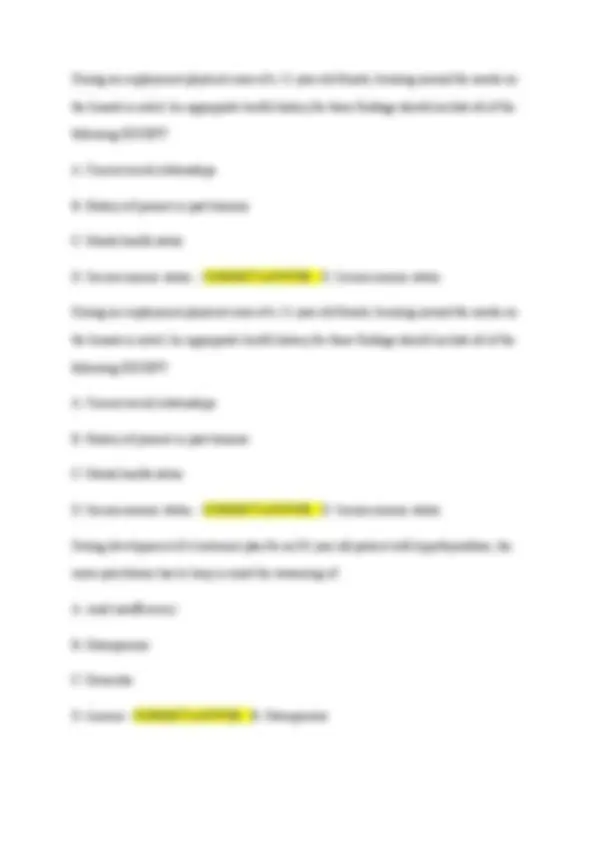
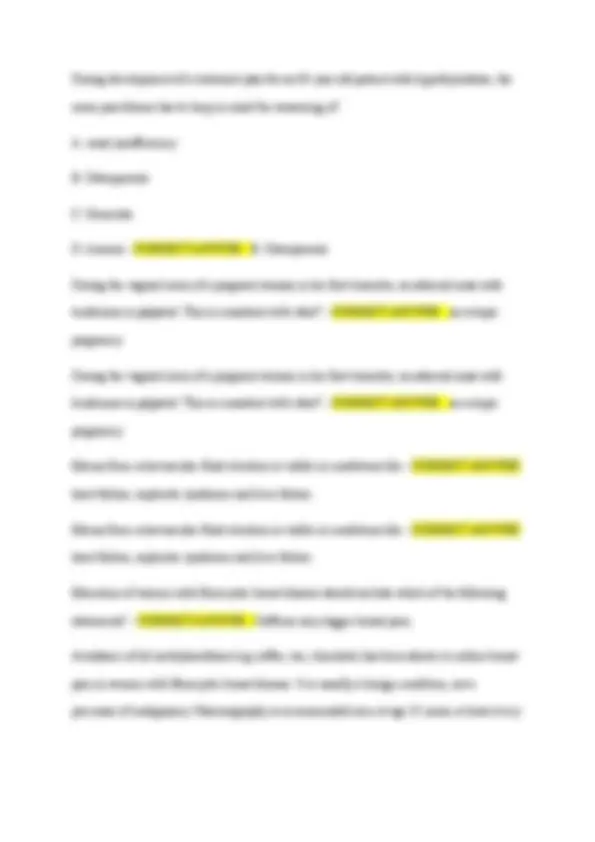
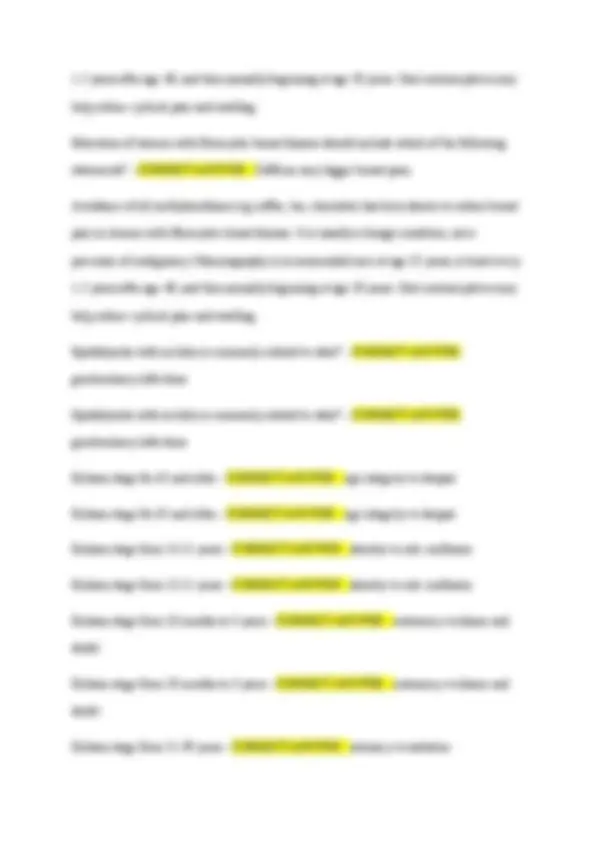
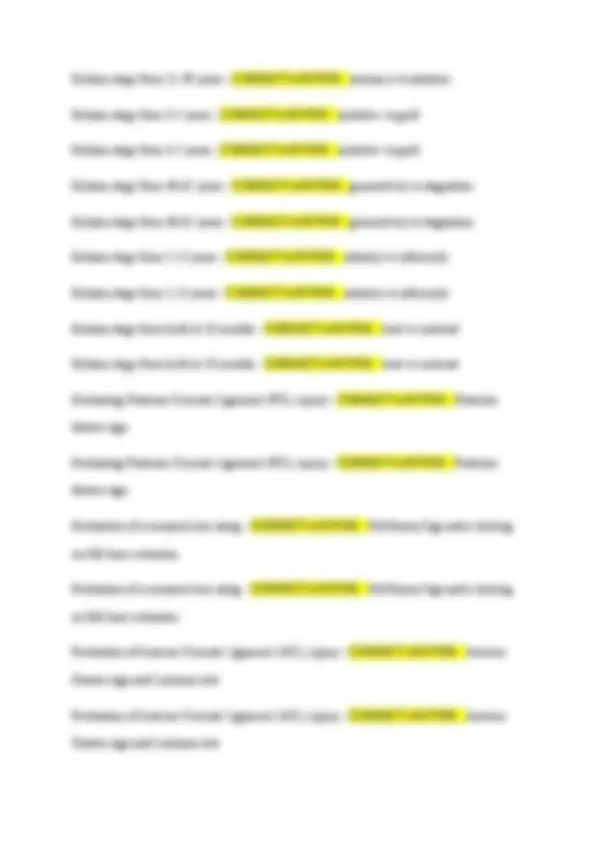
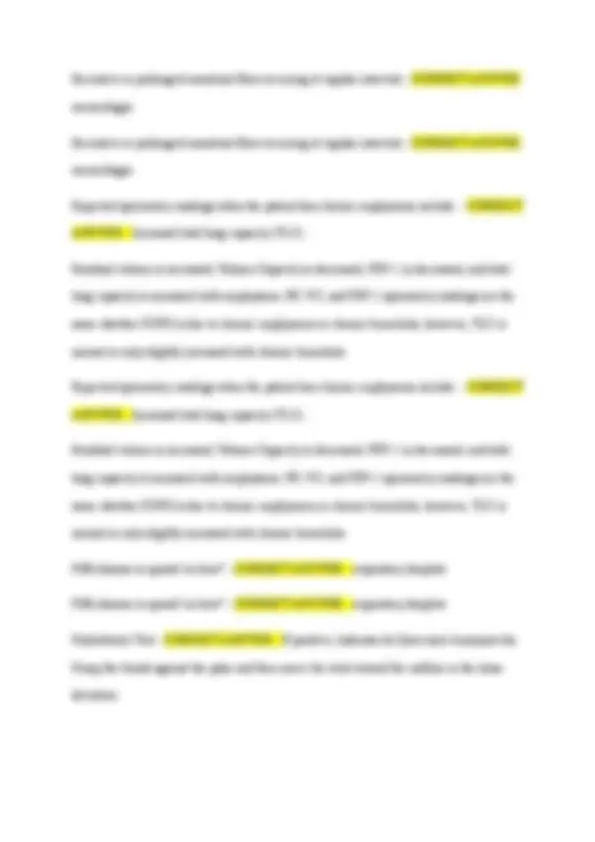
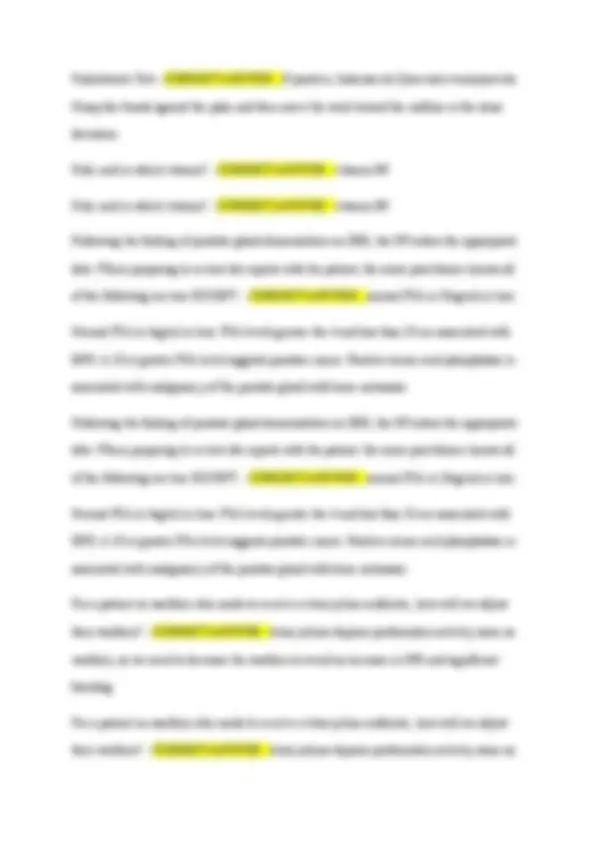
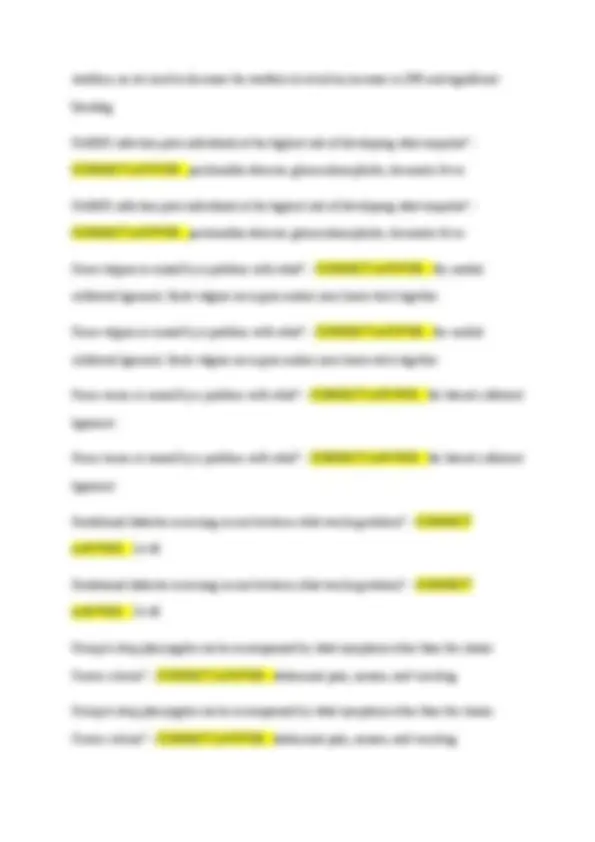
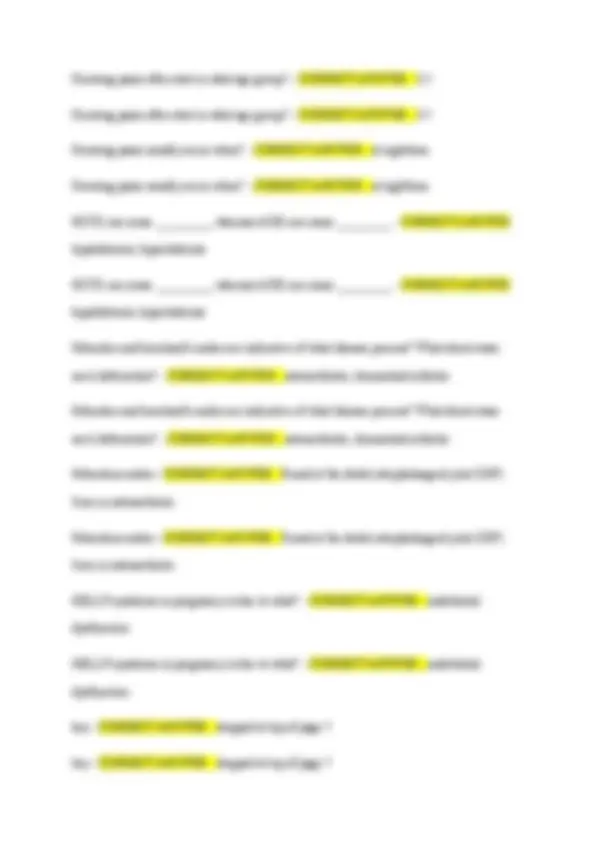
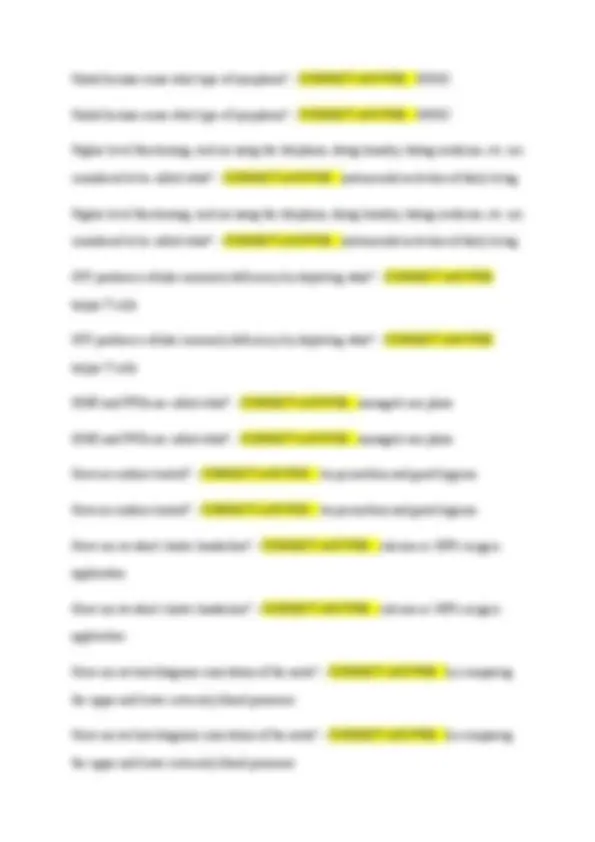
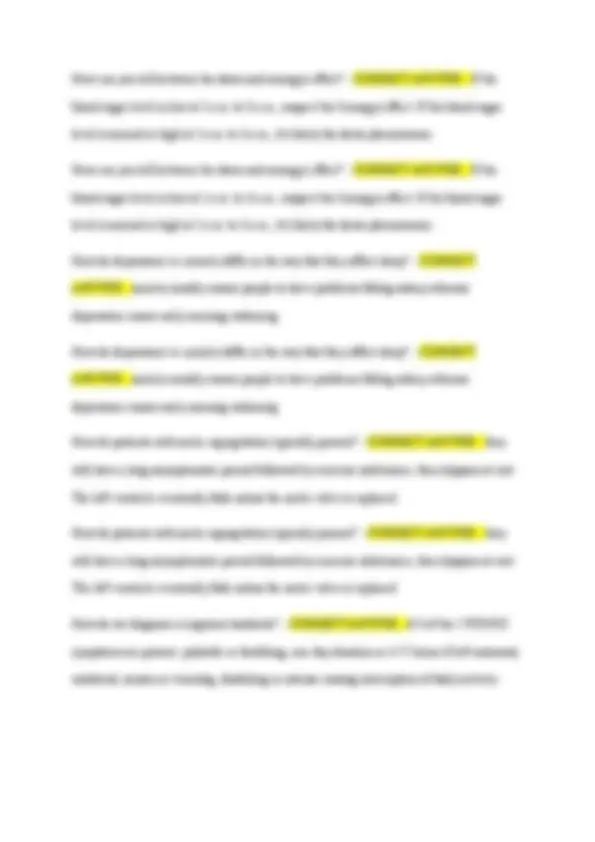
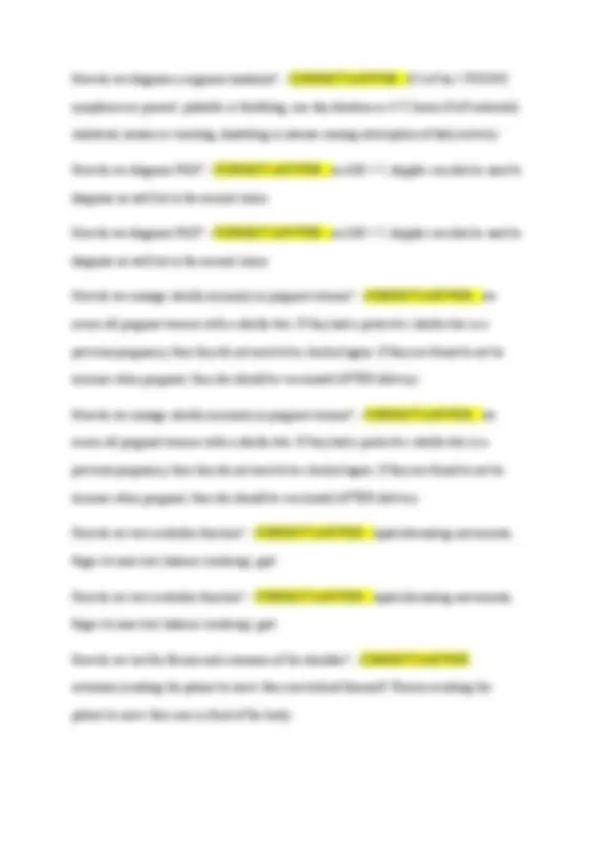
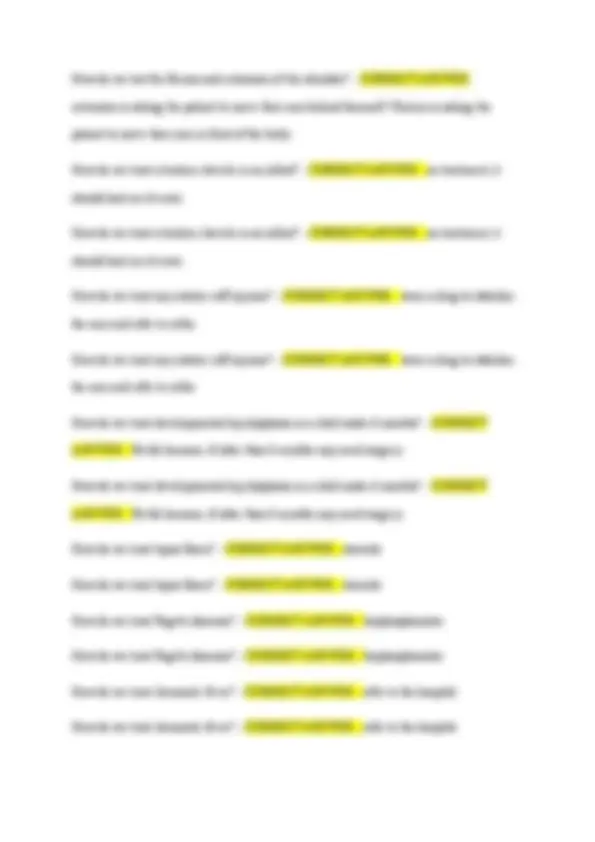
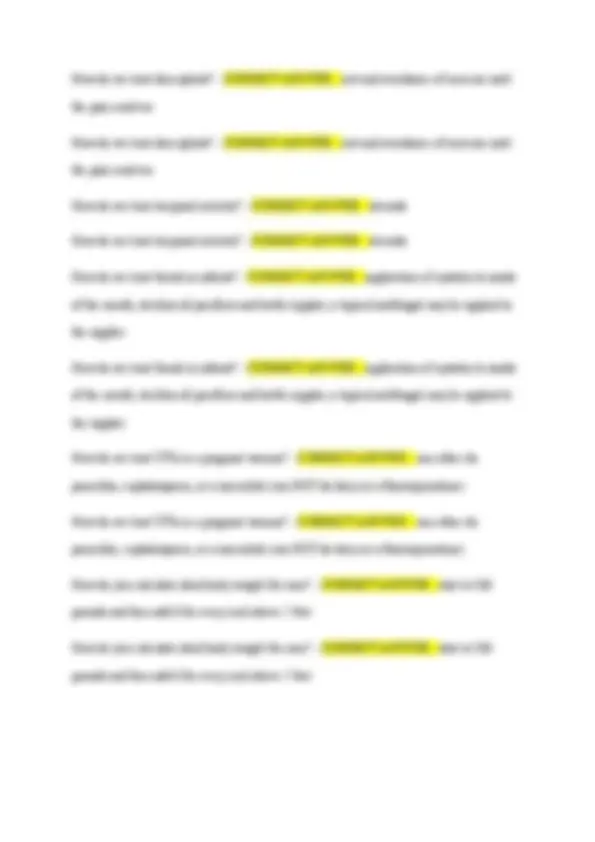
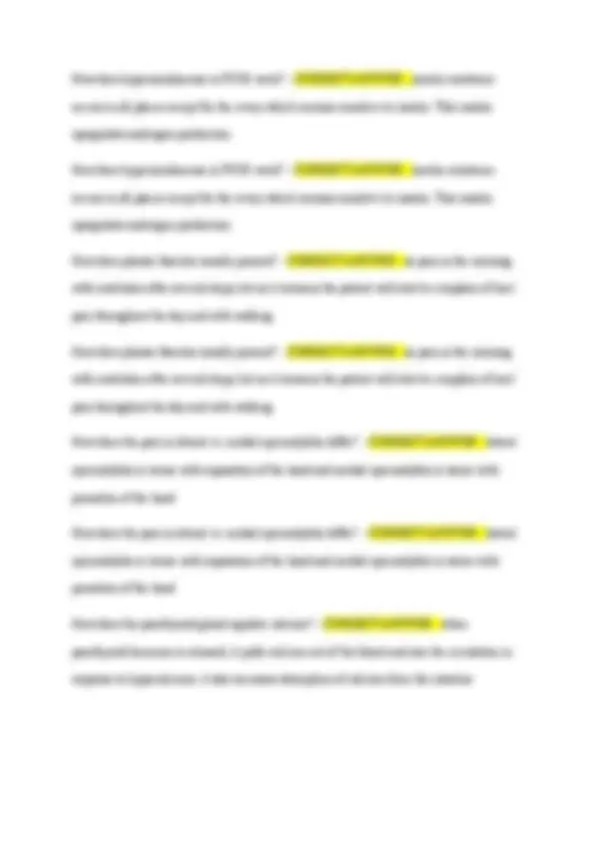
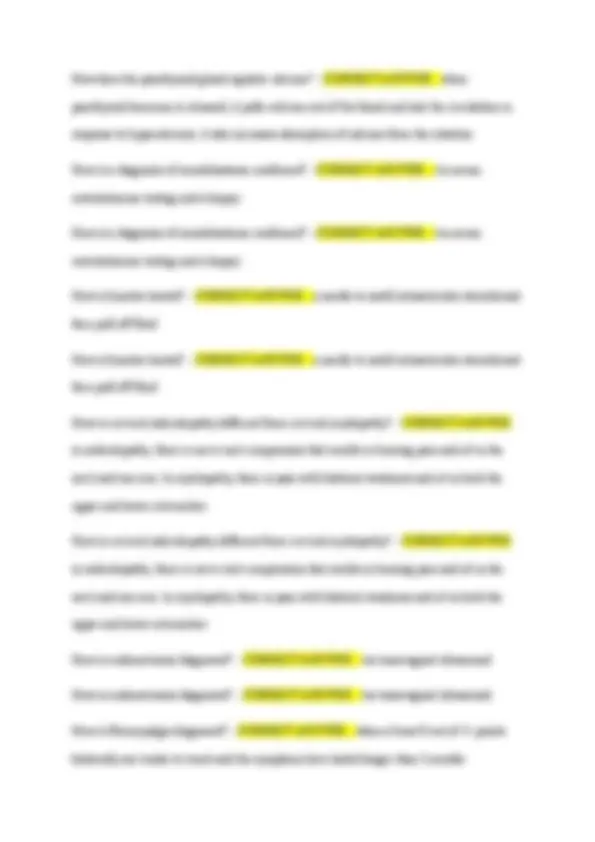
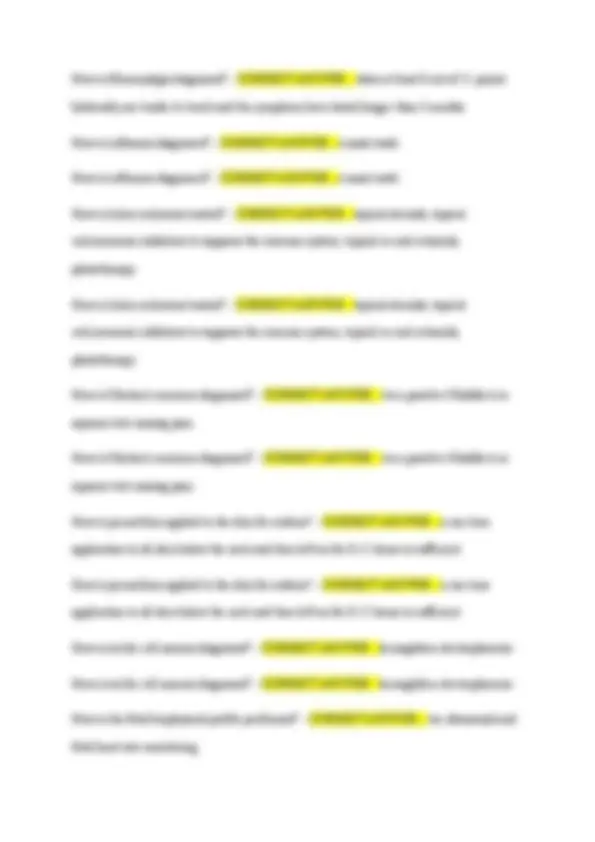
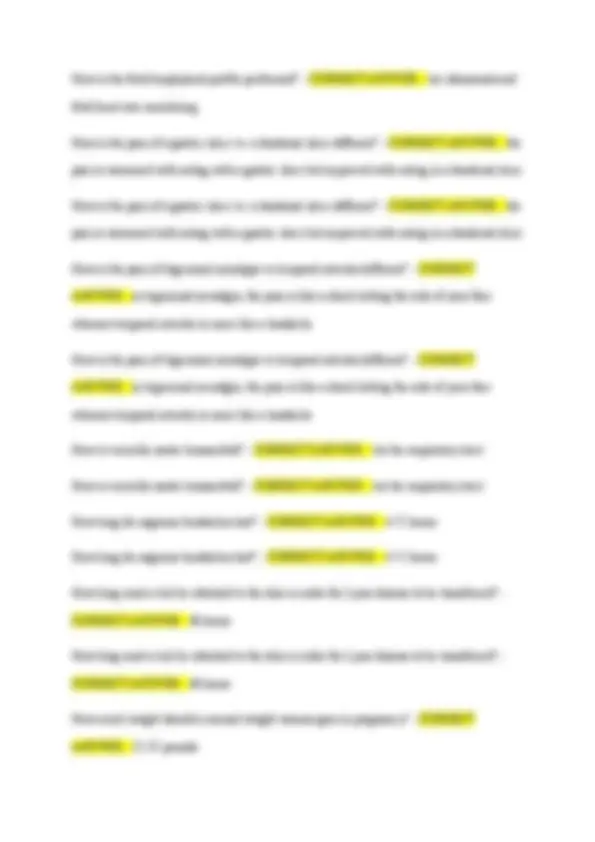


Study with the several resources on Docsity

Earn points by helping other students or get them with a premium plan


Prepare for your exams
Study with the several resources on Docsity

Earn points to download
Earn points by helping other students or get them with a premium plan
Community
Ask the community for help and clear up your study doubts
Discover the best universities in your country according to Docsity users
Free resources
Download our free guides on studying techniques, anxiety management strategies, and thesis advice from Docsity tutors
APEA PRE PREDICTOR EXAM LATEST 2024-2025 ACTUAL EXAM COMPLETE 1770 QUESTIONS AND CORRECT DETAILED ANSWERS (VERIFIED ANSWERS)
Typology: Exams
1 / 235

This page cannot be seen from the preview
Don't miss anything!





























































































14 year old patient who fell on a outstretched hand complains of proximal forearm pain. X- ray reveals a positive fat pad sign, and the patient is unable to fully extend the elbow. No definitive bony changes are seen on xray. The most likely working diagnosis is: A. upper arm sprain B. lateral epicondylitis C. Radial head fracture D. Olecranon bursitis - CORRECT ANSWER C. Radial head fracture. 14 year old patient who fell on a outstretched hand complains of proximal forearm pain. X- ray reveals a positive fat pad sign, and the patient is unable to fully extend the elbow. No definitive bony changes are seen on xray. The most likely working diagnosis is: A. upper arm sprain B. lateral epicondylitis C. Radial head fracture D. Olecranon bursitis - CORRECT ANSWER C. Radial head fracture. 2 year old child is diagnosed with radial head subluxation ("nursemaid's elbow"). After closed manipulation, the best indication of successful treatment is that: A. Swelling dissipates immediately B. Pulse and sensation are restored C. The child quickly begins to use the affected arm D. A click is felt while the child is extending and rotating the arm - CORRECT ANSWER C. The child quickly begins to use the affected arm.
A 14yo male with bronchitis is being treated with fluids and expectorants. He returns to the clinic with a fever of 103F, right pleuritic chest pain, and green sputum. Which of the following examination results would be expected? A. Right lower lobe crackles B. Decreased Fremitus C. Bilateral Wheezing D. Normal Percussion - CORRECT ANSWER A. Right lower lobe crackles. A 14yo male with bronchitis is being treated with fluids and expectorants. He returns to the clinic with a fever of 103F, right pleuritic chest pain, and green sputum. Which of the following examination results would be expected? A. Right lower lobe crackles B. Decreased Fremitus C. Bilateral Wheezing D. Normal Percussion - CORRECT ANSWER A. Right lower lobe crackles. A 15 year old patients returns for contraceptive services 2 weeks after a diagnosis of trichomonas vaginitis and treatment with 2gm of metronidazole (Flagyl). She reports that discharge and itching are gone, but she is urinating frequently, accompanied with alot of burning. The patient has not resumed sexual activity and has menstrated since her last visit. Examination reveals mild suprapubic tenderness, no leukorrhea, and a normal wet mount. Gonococcal culture and chlamydia tests are negative. Which diagnostic test should be performed immediately? A. Urine pregnancy test
B. Microscopic exam of urine C. Herpes simplex virus culture D. Repeat chlamydia test. - CORRECT ANSWER B. Microscopic exam of urine. A 15 year old patients returns for contraceptive services 2 weeks after a diagnosis of trichomonas vaginitis and treatment with 2gm of metronidazole (Flagyl). She reports that discharge and itching are gone, but she is urinating frequently, accompanied with alot of burning. The patient has not resumed sexual activity and has menstrated since her last visit. Examination reveals mild suprapubic tenderness, no leukorrhea, and a normal wet mount. Gonococcal culture and chlamydia tests are negative. Which diagnostic test should be performed immediately? A. Urine pregnancy test B. Microscopic exam of urine C. Herpes simplex virus culture D. Repeat chlamydia test. - CORRECT ANSWER B. Microscopic exam of urine. A 15 yo malue has a history of cryptorchidism which was surgically repaired. Because of this information, it is essential for the nurse practitioner to teach him about: - CORRECT ANSWER testicular self-examination. Cryptorchidism, even with surgical repair, is associated with increased risk for testicular cancer. A 15 yo malue has a history of cryptorchidism which was surgically repaired. Because of this information, it is essential for the nurse practitioner to teach him about: - CORRECT ANSWER testicular self-examination.
C. Fasting blood sugar (FBS), complete blood count (CBC), BUN, and sex hormone binding globulin D. Follicle-stimulating hormone (FSH), Luteinizing hormone (LH), prolactin, and thyroid- stimulating hormone (TSH) - CORRECT ANSWER D. FSH, LH, TSH A 17 year old female is suspected of having polycystic ovary syndrome. In addition to testosterone, the most appropriate diagnostic tests to order would be: A. BUN, creatinine, electrolytes, and dehydroepiandrosterone(DHEA) B. CBC, BUN, creatinine, and estrone C. Fasting blood sugar (FBS), complete blood count (CBC), BUN, and sex hormone binding globulin D. Follicle-stimulating hormone (FSH), Luteinizing hormone (LH), prolactin, and thyroid- stimulating hormone (TSH) - CORRECT ANSWER D. FSH, LH, TSH A 17 year old femlae has never had her menses. She is at Tanner stage III of sexual development. Her physical exam in completely normal, and her weight is appropriate for her age and height. What is the most likely diagnosis? A. Ovarian dysgenesis B. Dysmenorrhea C. Primary amenorrhea D. Secondary amenorrhea - CORRECT ANSWER C. Primary amenorrhea A 17 year old femlae has never had her menses. She is at Tanner stage III of sexual development. Her physical exam in completely normal, and her weight is appropriate for her age and height. What is the most likely diagnosis?
A. Ovarian dysgenesis B. Dysmenorrhea C. Primary amenorrhea D. Secondary amenorrhea - CORRECT ANSWER C. Primary amenorrhea A 20 yo male presents with a 1 month history of a " bump on my testicle" He reports being sexually active, frequent episodes of unprotected intercourse with multiple partners. Which condition should be suspected? A. Cancer of the testicles B. Torsion of the testicles C. Acute epididymitis D. Gonorrhea - CORRECT ANSWER A. Cancer of the testicles A 20 yo male presents with a 1 month history of a " bump on my testicle" He reports being sexually active, frequent episodes of unprotected intercourse with multiple partners. Which condition should be suspected? A. Cancer of the testicles B. Torsion of the testicles C. Acute epididymitis D. Gonorrhea - CORRECT ANSWER A. Cancer of the testicles A 21 yo college student presents to the sudent health center with copious, markedly purulent discharge from her left eye. The nurse practitioner should suspect: - CORRECT ANSWER gonococcal conjunctivitis.
inspriatory arrest. Ilcerative colitis presents with LLQ pain. Pain associated with pancreatitis is typically in the epigastric region. A 24 yo female taking an oral contraceptive has missed her last 2 pills. What should the nurse practitioner advise her to do to minimize her risk of pregnancy? - CORRECT ANSWER Double today's dose and tomorrow's dose and use a barrier method for the rest of the month. If 2 mills are missed on consecutive days, the next 2 days' doseages should be doubled and a barrier method recommended for the remainder of the cycle. A 24 yo female taking an oral contraceptive has missed her last 2 pills. What should the nurse practitioner advise her to do to minimize her risk of pregnancy? - CORRECT ANSWER Double today's dose and tomorrow's dose and use a barrier method for the rest of the month. If 2 mills are missed on consecutive days, the next 2 days' doseages should be doubled and a barrier method recommended for the remainder of the cycle. A 25 yo female has a history of frequent candidal vaginal infections in the past year. She is in a monogamous sexual relationship and uses and IUD for contraception. Of the following, which is the most likely underlying conidition predisposing her to recurring candidal vaginitis? - CORRECT ANSWER Diabetes. A common underlying cause of frequent infections is diabetes mellitus. Pregnancy increases the incidence of candidiasis, but is unlikely a factor with this patient. A 25 yo female has a history of frequent candidal vaginal infections in the past year. She is in a monogamous sexual relationship and uses and IUD for contraception. Of the following, which is the most likely underlying conidition predisposing her to recurring candidal vaginitis? - CORRECT ANSWER Diabetes.
A common underlying cause of frequent infections is diabetes mellitus. Pregnancy increases the incidence of candidiasis, but is unlikely a factor with this patient. A 25-year old presents with the chief complaint of decreased mobility and pain of the right shoulder exacerbated with movement. The patient reports that he participated in extensive house painting 24 hours prior to the onset of pain. He denies any trauma. Passive ROM is intact. No redness or ecchymosis is present. What is the next step that should be taken in order to make a diagnosis? A. Palpate structures around the shoulder B. Obtain an MRI to evaluate the shoulder C. Order an Xray of the shoulder D. Request an EMG - CORRECT ANSWER A. Palpate the structures around the shoulder A 25-year old presents with the chief complaint of decreased mobility and pain of the right shoulder exacerbated with movement. The patient reports that he participated in extensive house painting 24 hours prior to the onset of pain. He denies any trauma. Passive ROM is intact. No redness or ecchymosis is present. What is the next step that should be taken in order to make a diagnosis? A. Palpate structures around the shoulder B. Obtain an MRI to evaluate the shoulder C. Order an Xray of the shoulder D. Request an EMG - CORRECT ANSWER A. Palpate the structures around the shoulder
A. Urticaria B. No remarkable clinical symptoms C. A green mucoid penile discharge D. A penile ulcer - CORRECT ANSWER B. No remarkable clinical symptoms A 2month old infant is presented for examination and immunizations. History includes an uncomplicated full-term delivery and hepatitis B virus immunization shortly after birth. Examination is unremarkable except for a diffusely erythematous (not beet red) macular rash in the diaper area., sparing the inguinal folds. No satellite lesions are noted. The infant's rash is most likely caused by. A. Candida albicans infections. B. Eczema C. Seborrheic dermatitis D. Contact dermatitis - CORRECT ANSWER D. Contact dermatitis A 2month old infant is presented for examination and immunizations. History includes an uncomplicated full-term delivery and hepatitis B virus immunization shortly after birth. Examination is unremarkable except for a diffusely erythematous (not beet red) macular rash in the diaper area., sparing the inguinal folds. No satellite lesions are noted. The infant's rash is most likely caused by. A. Candida albicans infections. B. Eczema C. Seborrheic dermatitis D. Contact dermatitis - CORRECT ANSWER D. Contact dermatitis
A 3 year old patient presents at an inner-city clinic with fever, cough, malaise, and loss of appetite. The patient lives with several relatives, including a grandmother who also has a cough. Which of the following diagnostic tests would be most appropriate for the patient? A. throat culture B. sputum culture C. Mantoux (PPD) skin test D. Cold agglutinin test - CORRECT ANSWER B. Sputum culture A 3 year old patient presents at an inner-city clinic with fever, cough, malaise, and loss of appetite. The patient lives with several relatives, including a grandmother who also has a cough. Which of the following diagnostic tests would be most appropriate for the patient? A. throat culture B. sputum culture C. Mantoux (PPD) skin test D. Cold agglutinin test - CORRECT ANSWER B. Sputum culture A 32 year old patient reports a 6-month history of intermittant symmetrical swelling of the wrists and daily morning stiffness lasting 1 hour or more in and around other joints. What is the most likely diagnosis? A. Rheumatoid arthritis B. Osteoarthritis C. Gouty arthritis D. Reiter's syndrome - CORRECT ANSWER A. Rheumatoid Arthritis
A 38 year old patient is being treated the by the NP for heavy vaginal bleeding secondary to multiple uterine leiomyomas. Her uterus is greater than 12 weeks gestational size, her hematocrit is 28%, and she has not responded to hormonal therapy. Which of the following would be the most appropriate intervention at this time? - CORRECT ANSWER Obtain a gynecological consultation Gynecological consultation is recommended for a patient with a uterus greater that 12 weeks gestational size, significant anemia (hct <30),. o a normal endometrial biopsy with failure to respond to hormonal therapy. A 38 year old patient is being treated the by the NP for heavy vaginal bleeding secondary to multiple uterine leiomyomas. Her uterus is greater than 12 weeks gestational size, her hematocrit is 28%, and she has not responded to hormonal therapy. Which of the following would be the most appropriate intervention at this time? - CORRECT ANSWER Obtain a gynecological consultation Gynecological consultation is recommended for a patient with a uterus greater that 12 weeks gestational size, significant anemia (hct <30),. o a normal endometrial biopsy with failure to respond to hormonal therapy. A 38-yo male experiences a sudden onset of acute abdominal pain radiating to his groin. He is having difficulty walking and is nauseated. He denies any trauma or previous groin injuries. Examination reveals diffuse swelling of the left testicle and negative cremasteric reflex. The most likely diagnosis is: A. Testicluar cancer B. Testicular torsion C. Appendicitis
D. Epididymitis - CORRECT ANSWER B. Testicular Torsion A 38-yo male experiences a sudden onset of acute abdominal pain radiating to his groin. He is having difficulty walking and is nauseated. He denies any trauma or previous groin injuries. Examination reveals diffuse swelling of the left testicle and negative cremasteric reflex. The most likely diagnosis is: A. Testicluar cancer B. Testicular torsion C. Appendicitis D. Epididymitis - CORRECT ANSWER B. Testicular Torsion A 38-yo pregnant patient at 18 weeks gestation, complains of feeling light-headed when standing. Which of the following is an appropriate response by the NP? - CORRECT ANSWER Blood pressure normally decreases during pregnancy and can cause this symptom. Blood pressure normally decreases during pregnancy, reaching the lowest point during the second or third trimesters and rising there after. Patient education to rise slowly from sitting or lying is important. Low blood glucose may be the etiology, but an oral glucose tolerance test at this point is not indicated. A fasting blood glucose could be ordered, however, an electrocardiogram is not indicated. A 38-yo pregnant patient at 18 weeks gestation, complains of feeling light-headed when standing. Which of the following is an appropriate response by the NP? - CORRECT ANSWER Blood pressure normally decreases during pregnancy and can cause this symptom.
C. an inhalable corticosteroid D. a macrolide antibiotic - CORRECT ANSWER D. A macrolide antibiotic A 4-yo girl with a history of recurrent urinary tract infections returns for follow-up after diagnosis of the most recent infection. During the physical exam, the 4 yo tells the nurse practitioner that her brother (age 9) lies on top of her and rubs his penis in her pubic area. After completing the physical exam, the nurse practitioner must: A. Discuss the child's report with the mother B. Report suspicion's to the appropriate child protective services agency C. Refer the case to a physician D. Suggest psychological counseling. - CORRECT ANSWER B. Report suspicions to the appropriate child protective services agency. A 4-yo girl with a history of recurrent urinary tract infections returns for follow-up after diagnosis of the most recent infection. During the physical exam, the 4 yo tells the nurse practitioner that her brother (age 9) lies on top of her and rubs his penis in her pubic area. After completing the physical exam, the nurse practitioner must: A. Discuss the child's report with the mother B. Report suspicion's to the appropriate child protective services agency C. Refer the case to a physician D. Suggest psychological counseling. - CORRECT ANSWER B. Report suspicions to the appropriate child protective services agency. A 40 year old male patient presents with a 2 week history of rectal pain and itching. He reports a past history of constipation, and finding spots of bright red blood on toilet paper
several times a week. Rectal exam reveals a tender, swollen, bluish, ovoid mass. The stool guaiac test is negative. Which of the following actions should the nurse practitioner take? A. Prescribe diphenoxylate/atropine( Lomotil) B. Schedule a colonoscopy to rule out colon cancer C. Repeat the guaiac test three times and obtain complete blood count D. Prescribe bulk forming agents and hydrocortisone suppositories. - CORRECT ANSWER D. Prescribe bulk forming agents and hydrocortisone suppositories. A 40 year old male patient presents with a 2 week history of rectal pain and itching. He reports a past history of constipation, and finding spots of bright red blood on toilet paper several times a week. Rectal exam reveals a tender, swollen, bluish, ovoid mass. The stool guaiac test is negative. Which of the following actions should the nurse practitioner take? A. Prescribe diphenoxylate/atropine( Lomotil) B. Schedule a colonoscopy to rule out colon cancer C. Repeat the guaiac test three times and obtain complete blood count D. Prescribe bulk forming agents and hydrocortisone suppositories. - CORRECT ANSWER D. Prescribe bulk forming agents and hydrocortisone suppositories. A 47-yo patient presents with complaints of upper abdominal discomfort with nausea and burning after eating. The patient is not currently taking any medications. The most likely differential diagnoses would include: A. colitis and peptic ulcer disease B. Colitis and small bowel disease C. Gastritis and Crohn's disease